Text
From my “other blog page” (we’ll see how much I actually use it).
Dune Part Two, The Angel of History, and The Promised Land: Stepping Away From the Messiah
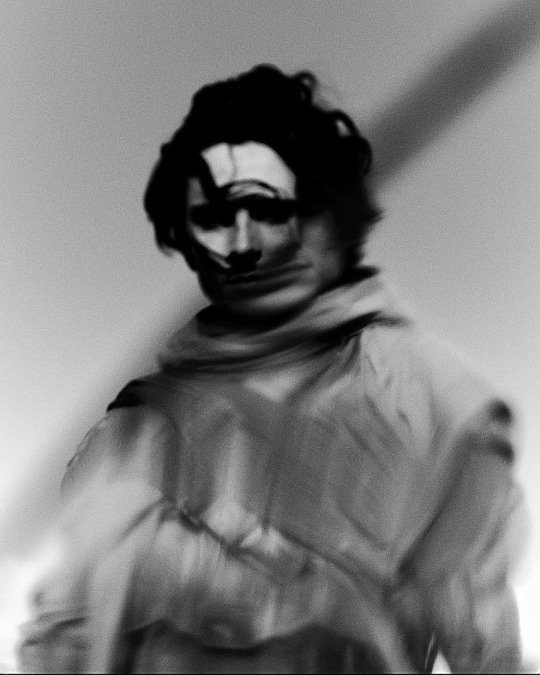
Stunning photo by Jack Davidson
So I didn't think I would be talking about Dune in my first post for this page (considering that I intended it to be more Star Wars focused and also since I haven't read the Dune books yet), but the final stretch of this movie has been on my mind ever since I left the theater a few weeks ago.
(Spoilers for Dune: Part Two)
It's strange in the sense that we are suddenly distanced from Paul, and also in that the climax seems to accelerate the story faster than ever before. So far (in both movies), there has been a pretty strong focus on Paul and a very deliberate pace that let all the plotlines simmer. It’s a masterclass of immersion, both technically and emotionally. The humanity of its characters aren’t lost in the many elements at play. Paul is a character whose empathy and how it makes him conflicted with what is placed before him make him quite likable. Spending so much time with him, Chani, and Stilgar makes us grow attached to them, not just because they’re the heroes, but because they feel real. And yet we’re pushed away. In the third act Paul's dark transformation happens swiftly (you’d initially think from how it’s shown the water of life turns you evil), and by the story’s end we only see Paul from a distance in the eyes of other characters, unable to see him resolving the concerns we’ve wrestled along with him, unable to get a good read on his motivations anymore. The final battles with our heroes happen rather quickly as victory over the Harkonnans and the Emperor comes pretty easily. On one hand this shift could feel unsatisfying, and the first time I watched the movie I was a little unsatisfied. But I’m not here to say this is a fault of the movie; in fact, this shift results in something greater happening, and it’s the most powerful triumph of Part Two’s story.

By the end, even when we do zoom in on Paul we're not sure what's really behind his intensity. (All the Dune screencaps are from Dune Perfect Shots 4K on Twitter).
Dune’s story up until this point, from what I know about these two films at least, is all about complexity, discerning the many variables, the need to carefully monitor both these variables and one's own behavior. The importance of mastering oneself. (This video by Alt Shift X talks about this really well, and it definitely helped me understand this aspect of the story better). But Paul’s tests, like the Gom Jabbar in Part 1 and the worm ride in Part 2, carry not just that significance but also the danger of a prophetic horror being more and more certain. Therein lies an irony - you can gain power but tied to it is something much larger that’s out of your control. This becomes pretty key to the whole story, and there’s something I was reminded of that helped me put all this into perspective. I brought this up in my first-time watch review too, but I think I have more to say about it now. But bare with me as this might end up being convoluted.

In one of my classes this semester we read the poem “The Promised Land” by Gabeba Baderoon, and I was really struck by this image that it alludes to called the Angel of History. Described by Walter Benjamin based on the painting Angelus Novus by Paul Klee, it depicts an angel whose wings get caught in the winds of a destructive storm “blowing from Paradise.” It’s trapped in the storm’s momentum going forwards with no way to escape. All the while, its head is permanently twisted backwards, forced to watch the wreckage of the storm, named progress, gathering below it. From what we discussed in that class this disturbing image suggests that all the events of history, all that we do or achieve or create, is not a series of events affecting each other, but instead one ever-building catastrophe barreling forwards. Both the Bene Gesserit’s century-spanning machinations and Jessica’s usurping of it all by birthing a boy. Whether the Harkonnen house or the Atreides house controls Arrakis. All of these are merely before a future that’s larger than any of them individually; the messiah and his holy war will come regardless. Even if it’s towards her own end rather than that of the Bene Gesserit, Jessica still uses their propaganda to facilitate his rise. The two houses end up converging anyways in their family trees with the Baron, and Muad’dib Atreides embraces it, merging the two families’ ideologies like the Kwizatz Haderach was always intended to. Whether his sudden ruthlessness is him embracing his desire for revenge or actually a strategic choice after sifting through the past and futures laid out, we’re denied of knowing for sure as we look at him from afar, and this denial by the film questions if the answer even matters much. The Angel image and the movie’s narrative dispel the idea that we have the capability to easily fix things when we make progress. It’s a notion that renders reasoning or means as having little ability to empower, envisioning us all moving towards the same horror anyways. It suddenly renders all the complexity of the plot and these competing ideas and factions inconsequential. And I don’t mean that in a bad way — it’s crucial to what the film is really getting at.
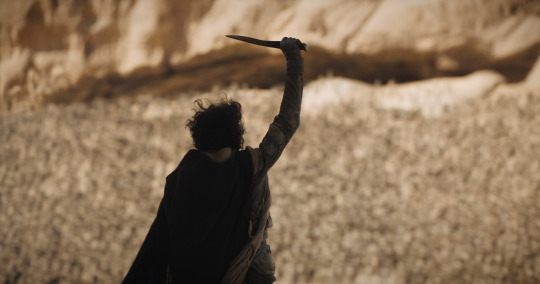
"We're Harkonnens... so that's how we'll survive. By being Harkonnens."

“You of all people should know there are no sides, Reverend Mother.”
Now, it’s fair to question the nihilistic bent of this (are we in the real world truly powerless to stop to this continuous catastrophe???), but the Angel of History and Dune use the stories they put forth as cautionary tales where that all-encompassing bleak endgame are meant to deconstruct our notions of progress and control. If we are powerless to shape history, how strong is the power we wield? And how good is the power we wield? As we strive for “paradise” and celebrate attaining it we often forget what happened as we got there, and we fail to see where we really are. If the reasoning for our actions doesn’t empower us, the effects of them in turn are even more debasing. The Baderoon poem that alludes to the Angel of History does so to examine this too. In its discussion of the end of apartheid and the ushering in of a democratic South Africa, “The Promised Land” weaves in the legacy of the jazz pianist Moses Molekelwa, who, despite influencing the poem’s speaker’s attitudes towards social progress (and appearing as an idol in that sense), is shown as getting off the hook in the eyes of history for strangling his wife to death. The triumph of his music is remembered while his wife’s murder is willfully forgotten, and the poem concludes that “our forgetting is also our home, which is why we will never leave the old country.” Baderoon warns of when the celebration of progress doesn’t factor in the ugly parts we still carry with us into the future, and her allusion to the Angel of History works to convey that danger. (Obviously the real anti-apartheid struggle of South Africa is very very different from the story of Dune, and I wouldn’t want to compare them to each other. Dune’s exploration of complicated progress instead speaks more towards the dangers of charismatic leaders and the co-opting of a cause). The only thing I want to highlight is just that Dune, Baderoon’s poem, and the Angel of History all hone in on the need to not lose sight of the now.


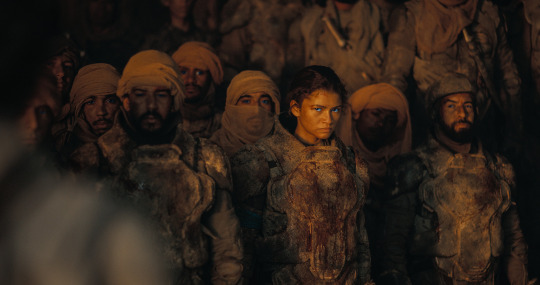
This is why the third act’s shift away from Paul works so well. The film doesn’t show people “forgetting” necessarily, but we do see them caught in the fervor without acknowledging what’s happening to them. Paul is an exception in that he sees it all: his arc sees him changing his perspective on the destiny laid ahead and taking control to ensure it happens on his terms. He doesn’t really turn evil, but since we’re denied of seeing past his new icy exterior as he looks ahead with his prescience, the film instead turns us back to the now, like the angel looking behind. We're with Chani now, the only (non-psychic) person who’s seeing this all. We already believe in Paul’s goodness. If we were to see what Paul sees and fully understand his reasoning, it would make it easy for us to downplay the costs. The story thus has us focus on the consequences of Paul’s path beginning to gather in real time, the Fremen being exploited as they are led into a coming bloodbath by their messiah. The quickness of these events compounds this fact. The path Paul takes may be the best possible option after considering all the variables, but the story doesn’t revel too long in the glory of his successful leadership and strategy.

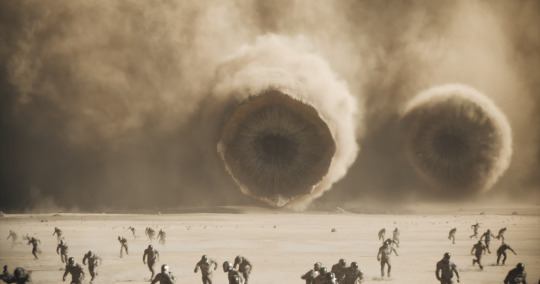
The awe-inspiring images speak not to just heroism but something volatile and intoxicating. It's not that the film oversimplifies the moral dilemmas at stake, but by letting the big battle, Gurney slaying Rabban, and Paul slaying the Baron happen all too easily, it removes the focus from only being the powerful exploits of Paul and the Fremen and adds emphasis on how they become like Harkonnens and how the Fremen become entrenched in Paul’s conquest. The Harkonnen bodies are burned like the Atreides were before them, and the Fremen Fedaykin ultimately fight carrying the Atreides banner instead of their own. They lose sight of this fact as they place all their faith in Paul, their cause and faith co-opted. It happens so fast and it can’t be stopped. We’re caught in the momentum of the storm raging, pushing us forward, and at the same time the film adjusts its focus to ensure that we don’t forget to recognize the consequences of Paul’s choices. This is what I find so compelling about this movie — we’re given a story that details the complexity of all things and also ultimately denies complicated factors and necessary evils of becoming excuses that wave the wreckage of progress away.
Hopefully this was enjoyable to read and wasn't pretentious or anything! Lemme know what you think about the movie!
6 notes
·
View notes
Text
Deathconciousness Video Essay
youtube
I realized that I forgot to share this here. I made a video discussing the “lore” behind the album’s ideas as well as the challenge of music being so bleak in the way that this album is. I also talked about Everything Everywhere All At Once. Hope you enjoy!
#deathconsciousness#have a nice life#video essay#youtube#music discourse#music blog#music discussion#music#indie#shoegaze#nihilism#everything everywhere all at once#existentialism
2 notes
·
View notes
Text
A New Frontier: South Asian Fusion
In terms of any actual formal music knowledge, I come from the side of Carnatic music, the Indian classical music style, having been learning the mridangam for around ten years under my guru, Sri T.S Nandakumar. I am always eternally grateful for all that he has done for all of us students, and one of the many things I admire about sir is his willingness to explore unconventional avenues with the mridangam. The mridangam is a two-sided barrel drum usually played as an accompanying instrument in a Carnatic piece that may feature vocals or violin, and veena as well. Nandakumar sir is a renowned accompanying artist, but he’s also given his students many opportunities to perform like chamber concerts and arangetrams. One really unique thing he’s done is a large orchestra of mridangams and other Carnatic percussion instruments at the Cleveland Thyagaraja Festival, which he’s done for multiple years and encouraged even younger students to practice and perform there. It’s unusual for the mridangam to take such a center stage like that, where you have around 100 players playing together in an epic display alongside veena and violin. It was also cool to see Nandakumar sir bringing in western drums into those performances as well, along with drum pads there and in other performances. Having that exposure from a young age really opened my eyes to the potential of Carnatic music elements in contexts that you don’t normally see, and I got curious about what else is capable. Carnatic music for example utilizes many, many different talams (time signatures) apart from just 4:4 (Adi in Carnatic music), and it would be really interesting to see how that could be utilized more generally.
youtube
South Asian fusion is a huge, diverse space that’s hard to really pigeon-hole because of how many types of South Asian music there are (Carnatic is just one, there’s also Hindustani, Sufi music, folk music, Bhangra, etc.), along with different genres that they are mixed with like jazz, rock, pop, etc. You had mingling in the past, like Ravi Shankar and The Beatles. Later on it grew, definitely a more recent phenomenon and likely accelerated due to immigration and assimilation in the west. Younger generations are really at the forefront on it – you see a ton of high school and college clubs doing Indian music or dance fusion. Rutgers has many, including RU Dhol for example. Some of these student clubs lean more on the side of Bollywood-oriented stuff, and there are times that can overshadow other ways to explore the genres – my sister sometimes talks about how the South Asian fusion club she’s part of really neglects classical dance forms like Bharatanatyam or Kathak. In that club it’s seen as the less hip thing, and people will say “it’s cool that you’re so confident to perform that” rather than actually having an interest in it and the people who want to share it. Then again, I'm talking about high-school pettiness here – it's not like this everywhere. RU Dhol combines South Asian instruments and styles of playing with western equivalents. This performance places electric guitars next to the Indian classical violin style in a really fun way.
youtube
One of my biggest experiences with South Asian fusion is with Brooklyn Raga Massive. My aunt is a Bharatanatyam teacher, and in 2018 or so she had collaborated with a theater director for a production of Jungle Book, where her students performed Bharatanatyam in a song. After the show, we had met some of the other musicians involved in the show, since my cousin learns Carnatic singing, my sister Bharatanatyam, and I mridangam, and we talked to a percussionist who was part of Brooklyn Raga Massive. He had told us about them – they do daily events at a Prospect Heights venue along with bigger events and performances, and he encouraged us to come on a Thursday where they hold an open mic jam session. We definitely got excited about this, and we went one evening.
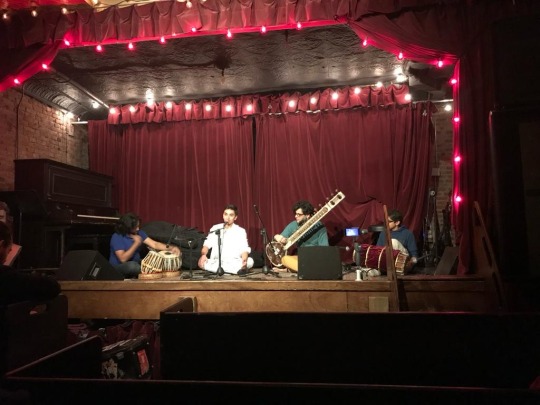
The venue was a real hole in the wall type bar with a small stage and seating area in the back, and there was a decent and rather diverse crowd of people. Dim lights and creaky wooden floors, very aesthetic. It’s interesting because now they’ve grown immensely as an organization, and I don’t believe they still have events at this place. It was really cool to see the really different talents displayed there – one woman performed a really interesting singing performance which now I can’t pinpoint what style it was. You also had more traditional classical instruments like tabla and sitar. What’s really cool is that even though I was only in eight grade and my cousin was only in ninth grade, they gave both of us the opportunity to play with them, and they were super friendly and inviting, even despite any mistakes or hesitation I had. There were no judgments, just the spirit of experimenting and playing. I still look at that night with a lot of fondness.
What I played that day, it was really incredible to get that opportunity and for it to be so low-key and welcoming. My cousin is also there on the stage (dressed in white), he’s an incredibly skilled Carnatic vocalist.
Recently I was inspired by all this and for my midterm assignment for the class I’m writing this for, I made a music track with mridangam and electronic effects in Ableton (free trial came clutch). I initially spent a lot of time worrying about doing it right and perfectly planning everything, but it only came together when I just let go of that and just messed around, re-arranging recordings of me playing and layering effects. Just doing it was fun, and I learned a lot from it.
youtube
shameless plug to my video
There’s a free-ness with something like this that’s a really different experience from traditional Carnatic music. At the same time, there’s a level of playfulness with Carnatic music too, as when you’re playing on stage you don’t practice with the other artist beforehand, and what happens there is often unexpected and exciting, and I’m reminded of that when I see jazz music too. To me says a lot about the inherent commonalities in what makes music so rewarding to make and experience.
#music blog#music discourse#music discussion#music#indie#new music#experimental music#carnatic#carnaticmusic#asian underground#south asia#south asian fusion#electronic music#mridangam#Youtube#long post
3 notes
·
View notes
Text
Lush Arpeggios and Nervous Twists – “Bending Hectic”
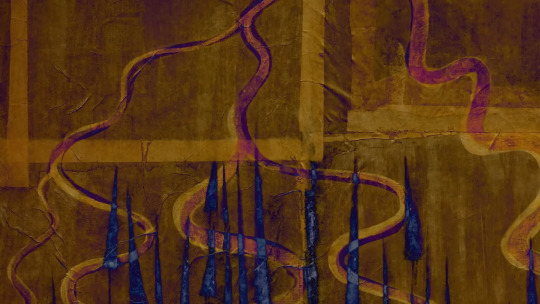
When thinking about a song to do a deep dive in, there were a variety of really evocative ones that went through my head – the tragic, operatic, synth-filled “At the Door” by The Strokes, the epic odyssey of “Fire on High” by ELO. I almost decided to write about the wild, strange, and dangerous speed chase of “Sugar/Tzu” by Black Midi, but my mind just kept coming back to—
youtube
"Bending Hectic" music video, an animation by Sabrina Nichols and Stanley Donwood.
I talked a bunch about The Smile, the band trio of Thom Yorke, Jonny Greenwood, and Tom Skinner, in my blog post about their tour this summer (still wish I could’ve gone in person!), and I think I already talked a little bit about “Bending Hectic” there. The Smile is going to be releasing their second album in January, which I'm super pumped about. This song is funny because I knew even before my Spotify Wrapped dropped that this would be my top track, and indeed it was with 131 listens this year.
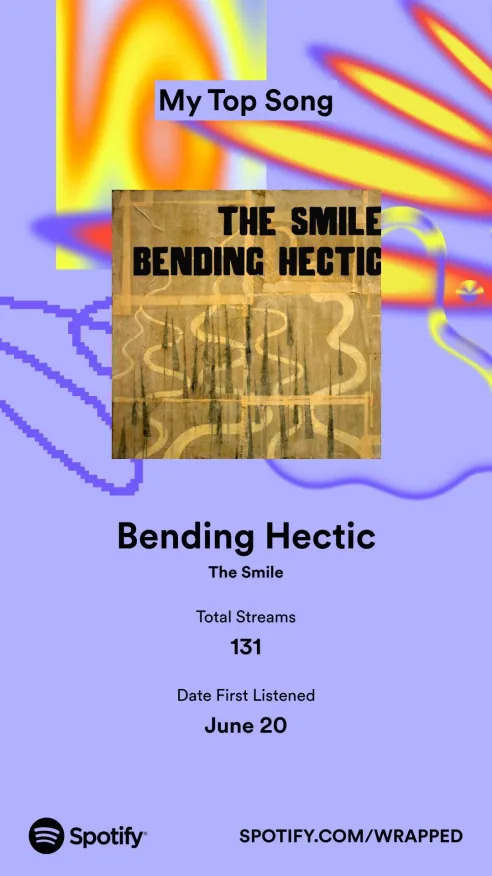
“Bending Hectic” is immensely cinematic, beginning with hushed lyrics from Thom Yorke in this incredibly evocative, emotionally moving experience, and it eventually turns into a soaring and jagged heavy metal climax. The specific emotions that this song as a whole evokes in how it sounds are very particular. There are very specific songs I associate with that vibe like “Bending Hectic” such as "Aruarian Dance" by Nujabes (and the song that samples, "The Lamp Is Low" by Laurindo Almeida), “Night Lights (1965 Version)” by The Gerry Mulligan Sextet, “Mojo Pin” by Jeff Buckley, and “Darkest Dreaming” by David Sylvian.
youtube
Love this song, so comforting.
It's cool to hear the original sample to get the original context and how Nujabes utilized it. This song is such a vibe too.
Bending Hectic was my top song this year. This was my top song last year.
Really serene yet pained, it also transitions between soothing chorus to more a more direct chorus.
This one makes you feel like you're floating in the night sky and lying in bed at the same time.
youtube
The ultimate comfort song, like an emotional lullaby.
Big nighttime vibes, or a rainy day, or any calm, maybe nature-oriented, atmosphere. The actual lyrics of "Bending Hectic" mention driving along the Italian mountainside. It's very intimate. Warm in that sense, also but very calm and tranquil, a cool, deep purplish blue.
youtube
I first heard this live performance of the song a few months before the studio version released, and seeing the stage lighting may have affected my perception of the "color" of the song.
There’s a lot of really interesting things about "Bending Hectic," like that genre shift, percussion, and use of strings, but its most curious feature is the lush, calming main guitar chord cycle which always ends with an off-kilter high twisting and turning, as if Jonny Greenwood is tuning the guitar. In this eight-minute track, more than four minutes have this tune playing, the first of two stretches of it being nearly three minutes, and it really informs the whole feeling of the song because of that even despite the big mood transition towards the end.
The song begins with the guitar chords, accompanied by a deep, sentimental bass tune, low jangling and gentle, rising crash cymbal sounds. (A quick aside about the bass, it really is a big contributor to that tranquil, emotional feeling, very comforting, and it periodically rises up in a kind of searching, yearning way). When you hear that twisting higher and higher at the end of the chord cycle for the first time, it really throws you off-kilter considering how soothing the tune is. This is the backbone of the song thematically, and we’ll see how it complements the lyrics and how other parts of the song echo it.
From what immensely little I know about music theory outside of Carnatic music (even there I have much to learn), I suspected that the chord cycle is an arpeggio, and my sister (who plays piano) confirmed this. When she heard the off-kilter guitar tuning part, she said that it was not really part of the arpeggio, but rather the same note being tuned higher and higher. With this we can distinguish the arpeggio and the guitar bending.
On r/thesmile I came across someone pointing out the incredible similarity of the arpeggio of "Bending Hectic" and this song, which is super cool. If you were to remove the guitar bending of Bending Hectic's main chord cycle it would give a similar feeling to this.
Possible inspiration for Bending Hectic verse chords
byu/smithsonian44 inTheSmile
The distinction made by my sister is formal music-theory-wise, but emotionally it’s felt too. With the particular feeling of the arpeggio, my sister mentioned a song that had a similar-sounding arpeggio as well. I bring this up because despite that similarity note-wise, it feels different, and that may come down to the type of guitar. Unfortunately I haven’t been able to find what specific guitar is used for this track, but the song my sister talked about had a sharper, acoustic sound compared to lusher sound of "Bending Hectic." The looseness of these chords makes it feel more raw. Key may play a component too, with "Bending Hectic" being in a lower key. It evokes much more soothing feelings, as if things are okay, like you’re taking a moment to relax, just taking it all in. (Like I said before, purplish-blue, RIGHT? ....No, just me?)
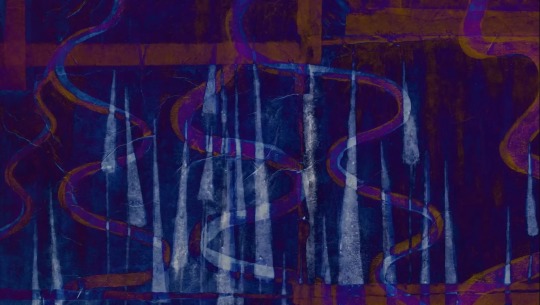
See! Purplish-blue.
Also mentioned earlier was how the song talks about driving along the Italian mountains, time being frozen as “you’re gazing at the view,” and it’s a genuinely beautiful feeling. ...Except when Thom Yorke says “Italian mountainside,” it’s “a sheer drop down the Italian mountainside.” It’s a car crash in slow motion. "I swear I'm seeing double, ohohh...." (I really love how Thom sings this line in particular - it brings this aching, accepting quality that matches the chilling string notes). It's weird because despite the danger of the lyrics, the arpeggio is telling you: "it's okay, you can rest now." You just want to float.... The arpeggio’s serene comfort is so essential to the feeling of the song, which makes the guitar bending that much more noticeable. The guitar bending out of tune goes higher and higher at some times, and at other times it goes lower and lower. Both give this growing nervous feeling, gnawing at you despite the calm. The threat of the car skidding “‘round the hairpin.” Every time the arpeggio plays out its vulnerability lulls you into a sense of security and, but then every time guitar bending concludes the arpeggio that security gets thrown off. Then when the arpeggio comes again it lulls you again and you say despite the nervousness “no one’s gonna bring me down,” but then you realize that determination is not to keep on going but instead to “let go of the wheel,” and he's fed up and wants to crash…etcetera etcetera. It’s a wobbling feeling of constantly having these two conflicting forces, and it’s unsteady despite feeling smooth overall. This three-minute beginning part of the song before the first chorus swings back and forth in tempo, starting slow, rapidly speeding up, and then slowing down. When the arpeggio speeds up with its lushness it feels like a wave of relief; when the guitar bending speeds up higher that nervousness tightens more and more.
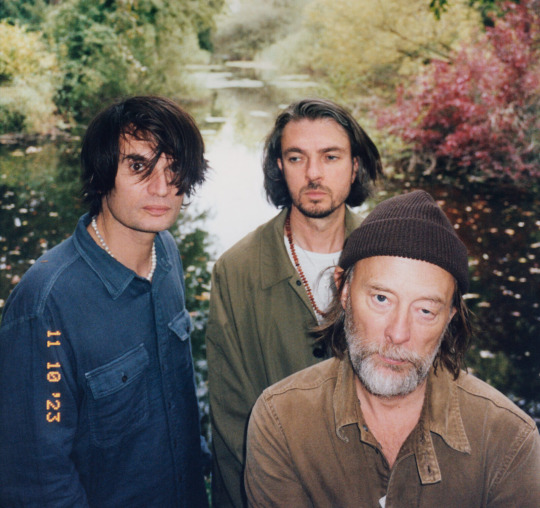
A pic of Jonny Greenwood, Tom Skinner, and Thom Yorke released along with the announcement of The Smile's 2nd album Wall of Eyes, which "Bending Hectic" will be on as well. The newest single released, which is the title track for the album, and it definitely has that dichotomy of calm and panic too lol.
The portion of the song (at the timestamp 4:14) following the first chorus returns to that arpeggio again, but this time at a steady tempo in line with the stable drum beat. The guitar tuning end of the arpeggio cycle plays on the down beat with the drums. Here, it’s stable, even with that off-kilter bending, which plays on the off-beat consistently. As I thought about this, I got the idea that the foreboding bending could now be something we’ve become comfortable with, but as I thought more about it while discussing with my sister, it’s more so continuing to creep up and threaten the stability that’s been constructed. The warm, optimistic strings cut out, and we’re back to just the guitar, drums and bass again. The bass stays low and steady in a foreboding manner. Lyrically it’s becoming more tense too – Thom says “the ground is coming for me now. I’ve gone over the edge. If you’ve got something to say…say it now.” With the guitar bending the song is slowly ratcheting up tension, as within the stable, narrow tempo and low wavering bass line there’s something simmering, that twisting nervousness remains even still – yes we may be used to it now but it’s also threatening to go careening off-course.
That’s exactly what does happen after Thom concludes the verse by saying again “I’m letting go of the wheel,” and all instruments cut out as strings are re-introduced. They're at first expressing concern, and then they turn shrill, horrifying, straight out of a horror movie. (The Shining comes to mind).
youtube
Michael Giacchino cooked so hard with The Batman score...the rising strings here!
This is when the song goes full metal mode. Though the arpeggio doesn’t return again, as this is the final climactic stretch, the same bending tuning comes back in the form of Thom’s vocals and the exploding guitar. He goes “Tuuuuuuurrnnnn” as his voice twists higher and higher, and the guitar matches him. I’m reminded of Hans Zimmer and James Newton Howard’s theme for The Joker in the score for The Dark Knight – the track has a similar nervous twisting off-kilter rising electric guitar.
I think it’s really cool how the central arpeggio and guitar tuning sound of this song forms the backbone of its “bending” motif, which all comes together in its final chorus thematically. It all converges here – in the thick of the car crash, despite the “slings” and “arrows” and obstacles, the crisis that we’ve been thinking would happen, we force ourselves to push through, and that turning wheel to avoid death is expressed with the same high-pitched bending guitar we’ve been hearing throughout the song. The line “I’ve got these slings, I’ve got these arrows” in the first chorus made it seem like “I force myself to turn” was an act of wanting the crash, but now it’s “despite these slings, despite these arrows,” and trying to turn has now become an act of perseverance, an effort to survive. It’s interesting because even though the “turn” is said with hope, in the same sentiment of “no one’s gonna bring me down, no” the foreboding guitar bending we've heard all this time and now hear again suggests that the crash and burn is inevitable. Maybe you can’t escape the crash you wanted so desperately before. The song ends with that feeling in a distorted gnarl of defeat. But the merging of incoming, inevitable pain with perseverance as done using the central guitar bending and concluding lyrics give an ambiguity, not entirely shutting that hope out entirely. It’s a specific line that two of The Smile’s members have walked with their bandmates in Radiohead in songs like “Let Down,” “How to Disappear Completely,” and “Weird Fishes/ Arpeggi.” The Smile's newest single for Wall of Eyes also has that, though its sentimentality is more superficial compared to its jaded outlook.
youtube
That dichotomy of hope and despair seems to always come back. One side never quite wins entirely.
#the smile#bending hectic#long post#wall of eyes#music blog#music discourse#music discussion#tom skinner#jonny greenwood#thom yorke#radiohead#rock music#new music#indie#spotify#music#youtube#Spotify#ethereal#rock#indie rock#Youtube#playlist#spotify playlist#music analysis
4 notes
·
View notes
Text
An Interview with Lilith a.k.a nicho santos is dead (pt2)
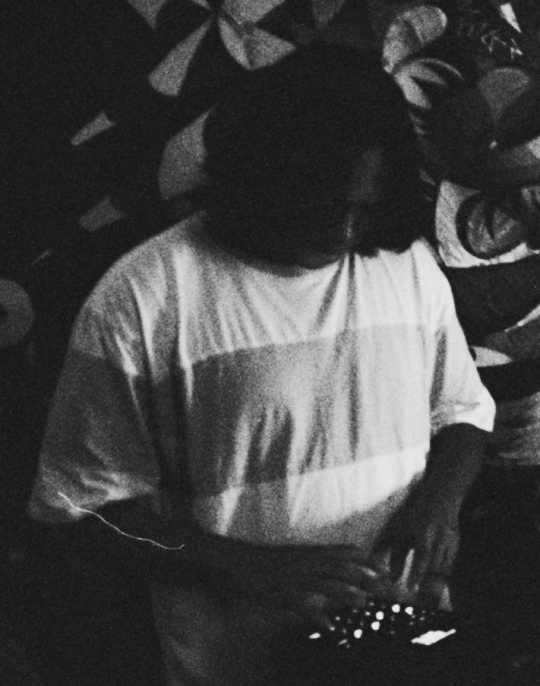
Another thing I was curious to hear you speak on was your development of your artist name and the personal significance that's had for you and your music.
Oh man. Oh man. Okay. That's a really good question. Yeah, let's talk about that. So obviously I go by Lilith now, but if you know me from a previous time, or if I give you permission to, I used to have a name and it was Nicho. Nicho derived from Nicholas from my parents, which I'm very grateful for. It was a good name, nothing against them. I love them for that. But– so I know for a fact though that when I entered college, I was in a really weird and ever-changing mindset. Cause I know I was just experimenting with identity. I was a he/they for like a damn good while actually now that I think about it, I never really took the plunge until college came around. It was a lot of change.
Granted it came with its emotional bouts. It came with, you know, just figuring shit out as a person. I mean, you know you're supposed to make mistakes in this time. And, you know, I'm grateful that I made those mistakes. I'm grateful that I'm able to grow as a person from there. But I remember at one point, and I think it was like the apex of the spring semester, where I just really didn't feel like myself, like the name didn't make sense. I didn't really see myself as a guy. I didn’t really…I mean I could definitely fit in. I can work my way around people. I mean, I have like my friend group in high school, you know, with you in it, obviously, I can pencil my way through like a bunch of hurdles. But the thing was, like, I never really associated myself as, I guess, "one of the guys." I mean, I was a part of the guys, but I wasn't really, I didn't really feel like one. I felt more like just me rather than like, "oh, I'm a boy, I have to do this one thing, another thing" that catered to whatever gender I had to be.
So at one point, my name just kind of died out to me, and I didn't feel like myself, really. And a lot of the music around that time – I don't think I even released music around that time. Because it just wasn't me. Like, it didn't feel honest to me. I only like to put out music if I know that it's very honest to me and what I want out of myself. If it's something forced, then like, why? You know, it's not, it's not me. It's just some sort of extension that I tried to put on, but it's not really me. So I think, over the summer, I did a lot of thinking in terms of identity and stuff. Granted, it was hard, like, you know, I still haven't like, fully come out to everybody yet about it, I mean, it's like a whole thing.
But one of the big things was just giving myself that choice. A lot of it was just like, remembering, you know, I can't control everything. But I can control the things that I have. I can't control the things that I can’t. If that name just didn't feel right to me, I think I just gotta choose a new name. And you can already see where this is going. I changed it. I wanted to be called Lilith for, like, a while. I told some people, they were so on board with it. I thank, again, I thank my Berklee friends so much, you know who you are. Thank you for just being so understanding, and being able to support me through such a crazy transition in my life, because, granted, let's say if I did this in high school, I feel like I wouldn't have gotten as much support.
Having the support just gave me the confidence to just do what I want more. I stopped thinking too much about “what could,” “what ifs,” “what do they think." And I just started really making shit that I wanted. I wanted my music to sound dirty. I wanted my music to sound imperfect, but like, raw. And that's exactly what I tried aiming for. I wanted to make dance-y music. I made a dance album. And just kind of having that freedom, not just in my name, but also identity and music choice is just such a nice thing to have.
And, you know, nicho santos is dead was like this whole arc. Like, I released a whole album because it was like, probably one of the last times I would ever make music in that echelon, but now I could experiment more upon it.
It was kind of like the closing chapter of a book, if I had to describe that. And that, the whole name change for like, maybe a couple months. As of November 7th, 2023, you know, I changed my username. I'm dressing the way that I want. I'm doing the things that I want. I'm not stressing about relationships too much. I just want to make the music that I want to make and make some good ass friends, have some fruitful relationships, be a good person. That's really it now.
And like, to think it was so simple now, but last year, it was not like that at all. My music definitely reflected that too (laughs). It was just a bunch of fucking confusion and chaos. And now that there's just like this level of clarity. It's just easier to make stuff now. I could just make whatever I want, and granted, you know, improve upon it, continue to practice. But yeah.
That's pretty profound. I think that's just a beautiful way to look at things, and something where you're being honest to yourself. It's like you said about being in control of the things that you can be in control of, and, you know, that's, I don't know that that's something that I think we can all aspire to. Because I think a lot of people, I mean, even myself, I feel like sometimes we don't really like, we kind of take that for granted.
Oh, for sure. I mean, like, control is such an interesting thing, like ego, all that. So I have like, so many fucking conversations about this with Eli. It's really nice, because I get to really reflect and say it out loud to a person, and they tell me what they think. And I'm like, “Damn, that's real!”
But even I'm still learning, you know. As people we never learn something and stop there. We're always learning. That's the most important part you have to remember. The goalpost will always move with you. But you will always surpass the ghost of wherever the goalpost once was, type of deal, you know? Every time you improve something, the goalpost moves further, but you know, you move forward as well.
Yeah, yeah. I really appreciate you talking about this and being so open about it. It’s something that's obviously very personal, but also something that I think is really important to hear.
Identity is just such an important thing, sense of self. A lot of this music industry, from what I've seen of the music industry – I haven't really dove into it as much as I think I have, what, I’m maybe 10 feet deep into the ocean out of like the hundreds of feet, maybe thousands – but there's a lot of people out there, it's very easy to get lost. It's very important to have a good group of people, but also yourself, you can rely on yourself the most. And being honest with yourself will just make that job easier.
Because if you're, if you're playing yourself up to be like something that you aren’t, and then you need to fall on that, that shit's gonna fall flat. You need to be honest with yourself 100% of the time, and I'm telling you, the music will show. The music will show that you're being honest with yourself.
There's like, I could probably bring up two albums off of my bandcamp where I could really talk about that. It was power creep: the outtakes. That album was probably– I love that album, but that was…honestly not me. I wasn't who I wanted to be.
I made Letters soon after and it was like a whole like ambient album and that was like one of the best projects I made in my opinion. No one got it, but I was happy. And honestly? That's really all I can ask for myself. I really make my music for me. But if you fuck with it, if you vibe with it, that's awesome too. If you don't, that's awesome. I'm just a choice, I'm french fries at the whole buffet. You don't gotta get me, you know. If you don't like me, it's fine you know, my music's gonna be here. Not going anywhere.

Lilith has an experience that is really important to hear, and I was extremely grateful that they shared that here, especially considering how personal it is. They also bring a really insightful perspective that rings true in general. It seems to be at the crux of their strive for authenticity on both the personal and artistic level. Lilith goes further into detail with how they stay personal and authentic in their production work.
I guess the other thing I was kind of wondering is when you when you're making an album, or rather when you're like making a song and you use samples, do you start with the sample and then build off of it or is it something where you have an idea and then the sample comes next?
Hmm, that's a good question. Producing is a very emotional thing for me. It can vary every time someone asks me about my process. It does vary from time to time because usually I build off of an emotion. I just kind of walk in, I let myself become a vessel to whatever is around me, and whatever I start with, I start with. If it's drums I start with drums. If I start with a sample I start with a sample. But my emotions do play a lot into the types of samples that I choose. I don't know how much you can hear it in the new album, but like I chose a lot more, I guess…comforting? I wanna say comforting, but let’s say it's just super energetic, makes you want to move a little bit. I was looking for stuff that had that energy to me, and If I could find it and harness it then I would put it in the track. Make it. Do what I had to do.
Yeah, that's really interesting. I can see how it all kind of goes back to that feeling of authenticity and what's true to what you're trying to do. One thing I have been meaning to ask is about the way that you use percussion; oftentimes when you have the percussion it kind of syncs with other sounds that are sucking in and out – ducking out. It's just always a really interesting effect, and also something that I can't really think of being utilized in the way that you have with your music. There are times where it feels like it kind of contributes to the rhythm of the track, I don't know the technical terms of it. I think it's one of the things about your style that’s just really fascinating.
Oh yeah, yeah, side chain compression man. I’m not going to get into the nitty gritty but side compression is when you take two sources of audio– compression essentially equalizes everything so it makes the quiet parts louder and the louder parts quieter– if you have a sound that completely overbears the quieter signal it’s going to duck out, and to compensate, the smaller signal will get louder after the hit, so it creates this ducking effect that…this is all very technical stuff, I go to a music school, I’m embarrassed. Honestly, it gets the job done.
It's interesting though, because I was thinking with sidechain compression…my teacher Daedelus, I'm so thankful for Daedelus, shoutout to them, if you don’t know who Daedelus is I’m very sad. I’m joking, of course. No they're just super important to like music as a whole, and I'm very grateful to call them my teacher and a peer.
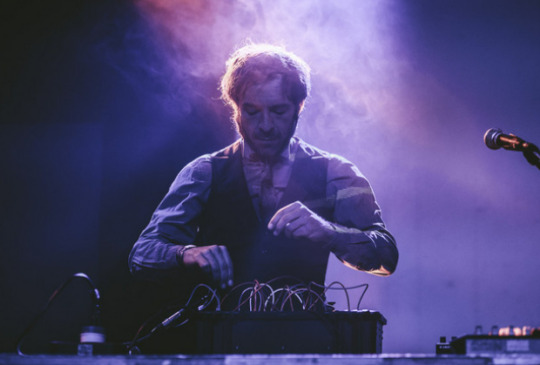
The big thing about it was, they had this album called What Wands Won’t Break, and it toyed with this idea of loudness, and how far you can push something to get different qualities out of it, and how much it can evoke this raw feeling of like primal essence, if I had to describe it. They completely went out into the outskirts of dance music and turned the volume all the way up and harnessed this energy to bring out these crazy different parts of the track you never thought would have been able to exist if they hadn't played with loudness.
What sidechain compression is for me is kind of like that, because now I play with the idea of loudness, but being able to suck away from that with something that's just as loud. It’s kind of like…it moves me a little bit, especially with the more emotional samples? I don’t know, just like the absence of that kind of emotional cord, and that can maybe tug at your heartstrings a bit. But then having it come back after it being taken away from you, and then having it taken away…it's like this crazy push and pull and like, you know, my roommate Trey – I love my roommate Trey – he hates sidechain compression. It's not for everybody. Yeah, he's like “Why are those beats so quiet? I want to hear the beat?” I fucking love that shit! I do not care about what he says, I love that– I will defend it until I die. But I totally get what he's coming from too!
But like, you know, like it's an interesting way to get, like, value, it…I'm speaking so much on it but at the end of the day It's just: cool drum, makes the sample duck under volume, and it comes back out, and it makes my neurons active. It's really just as simple as that, but emotionally it can do some stuff! Like I'm not gonna try to come off as some sort of like pretentious, “well, you see the sidechain compression akshully provokes something with it–” well, it does, yeah, but it's not that deep. Sometimes it just sounds cool!
You know, I've learned a lot, especially through music, and being in the industry, gifts will just come and either you just accept them or reject them. You can't just dive into it like well, “Why did I get this? Why?” Just like dude, it's there! You don't have to look too deep into it. It just is, whether you like it or not. You can accept that shit or reject it. But either way, it's still gonna be there.
Yeah, that was great, to hear your explanation and thoughts on that. I find it's really fascinating the way that you kind of talk about that emotional component with how it affects the rest of the song. Yeah, that's crazy!
Yeah, I mean like it’s simple. Dynamics, volume plays such a big role in music, you know. Simple silence, sometimes having something be quiet or maybe have something just be loud all of a sudden. But I can just evoke something whether you like it or not. A reaction and emotion maybe It's just more or less like finding a way to trigger that emotion and then doing that consistently while also like finding new ways to express that.
Cuz you know, I can do the same tricks for a while, but I'm experimenting now. I'm back in like my, “Okay, I gotta figure this shit out. Okay. What do I gotta do for this? Okay, what can I do differently?” You know, small things, you keep working on it. You essentially theseus-ship your way into a completely different sound. It just takes time and it just means consistency, and I’m very thankful for my work ethic because I don't think I'd be able to do it if I was any lazier than I am right now.
There's a whole lot of really really interesting and insightful stuff that you're telling, I really appreciate you taking the time and letting me interview you!
Yeah, of course! And like I'm honestly super grateful. Like I'm very honored that you thought of me to ask me for an interview.
Lilith's approach to music production is always from a place of having an authentic sound and working outside convention to, as they correctly describe, evoke something raw. It's also always from a place of true passion for the craft and for their friendships.

#nicho santos is dead#nsid#music blog#music discourse#music discussion#daedelus#music#hip hop#experimental#experimental music#artist interview#bandcamp#spotify#Spotify#Bandcamp#new music#long post
5 notes
·
View notes
Text
An Interview with Lilith a.k.a nicho santos is dead (pt1)
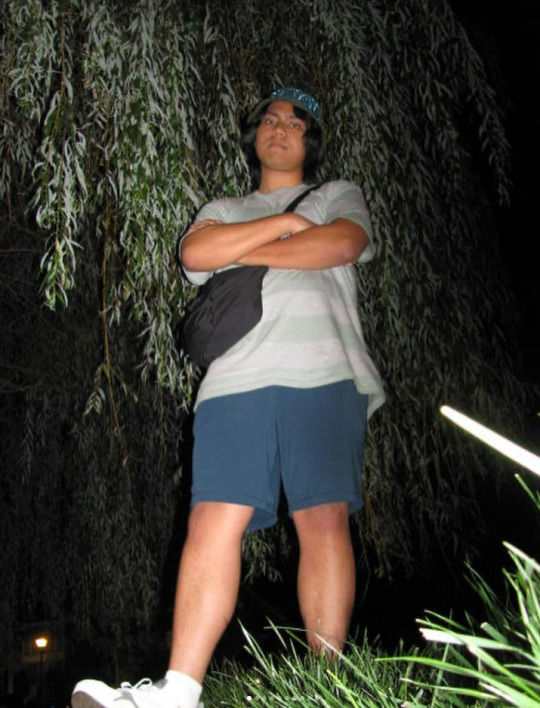
Earlier this week I had a really in depth and insightful conversation with a good friend of mine from high school, Lilith Santos (they/them), an experimental hip-hop producer studying music production at Berklee College of Music in Boston. They’ve been doing a lot of really interesting work with their solo albums and collaborations with different artists, and I was really grateful to hear from them about a variety of different topics like their collaborations, their personal journey as an artist, elements of their particular approach to production, and their personal philosophy as an artist and a person.
We started catching up on what we’ve been up to. Lilith said that they’ve been busy with a lot of classes, but they’re doing some upcoming shows in Boston as well.
I’ve gotten to know Lilith pretty well these last few years, and one of the things I’ve always admired about them is their authenticity and sense of community. In our big and close-knit high school friend group I’ve definitely felt this, and Lilith spoke a lot here about the way that they look at things and how that’s shaped and been shaped by their journey with music.
I know you've been working with a lot of different artists lately, like Annie Elise, Maz, Ghais Guevara, and asoookha. Is there a particular story when you met one of these artists? What was the start of one of those creative collaborations?

Oh, for sure. I could give you the answer right now. I could do it for all of them, actually. It's not that deep. If we're thinking chronologically, then the oldest person that I know from these two, it has to be Annie, Annie first. Annie is someone that I met online during the peak of the COVID pandemic and all that whole jazz and stuff. And it was a Discord server that I would regularly flock to because I did moderate in that (laughs) as lame as that sounds. Jokes aside, I am very proud of doing my role in the community for that amount of time. And actually, Annie is the person that convinced me to go to Berkeley to begin with.
Oh, wow.
Yeah, she was the person that was actually willing to encourage me to audition, do all the stuff that I had to. But it kind of just started off on like a very mutual basis. Like we had friends of friends, she was at Berklee at the time before she dropped out. And, you know, we would talk a lot, but nothing really would suffice until I really got into Boston.
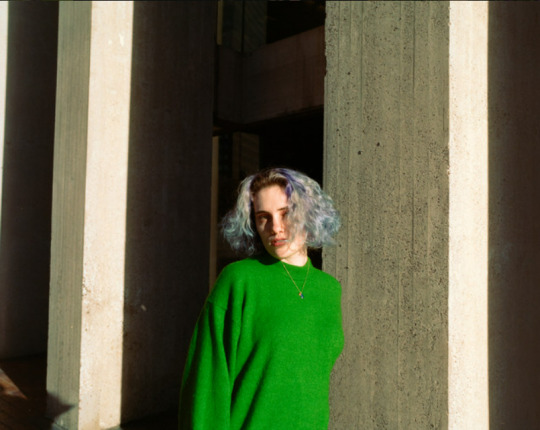
Now, maybe it was like a couple months before I got to Boston. And keep in mind the mindset that I was, I just had gotten out of like an eight-month relationship and she had just gotten out of like a three-year relationship. I told this story to a lot of people because it's really funny how we ended up coming with this idea [their music project, The Heartmenders] to essentially cope with our loss of partners, but also the gain of our fruits of a new life, essentially. And what happened was I was visiting Boston beforehand, just to kind of check out the school, visit Annie and all that. And I remember the first night that I arrived there, I'm driving over to her place, I'm trying to find parking and I get a text and she's like, “Sorry if I seem upset today. I just got broken up with.”
And I'm like, holy shit, that couldn't have been more insane timing than what happened to me. So, you know, being a friend first, I listened to her. We went out to get pizza, it was like this whole, it was a really nice night. I look back at that night with such fondness and joy, but in retrospect it really was the start of everything.
Cause I remember she would text me two months later, on and off talking. This was after I got into Berklee. After she helped me with my audition process, the year prior, she was like, “You know, well, since my ex doesn't have the performance privileges to be with me anymore, do you want to perform with me?” Already getting a gig opportunity before school started was crazy to me, and I'm so fucking grateful for this moment in our friendship. I'm very grateful for her in general. I can tell you that I'm grateful for all these people. When I got that opportunity, it was such an easy thing to say yes to, and I'm so glad I did.
It was at Bill's bar, for a Breaking Sound showcase. And it seemed like the biggest thing in my life. Now it's like, you know, footnote of the past, but it's like one of the biggest things that happened to me. And in that period of time of moving in, getting settled into school and figuring stuff out before the show, we were like, “Hey, let's just make some music together so I don't have to just perform like all your stuff – no offense, I just want to be able to perform some of my stuff as well.” And she’s like “Yeah, sure!”
I feel like we were super lucky in how we caught lightning in the bottle that day when I was making beats over at her house and we were laying down vocals. She was so easy to work with. She really knew her way around the DAW [digital audio workstation], I was still more or less an amateur. I'm still a student in my craft, I'm still learning how to do all of that stuff, but, you know, seeing her work inspired me to figure out a work process on my own, work harder on my stuff. And we would just end up sending a bunch of shit back and forth to each other from the summer before I moved into Boston.
I think the important thing was that the relationship, the friendship, was already established. So that made the work 500 times easier. Being able to work with her on that, get like devil's advocate on certain inputs, but also just being able to rock out and like have no stress and making shit with was probably one of the biggest blessings I could ever receive, and it definitely did carry into how I treat a lot of my collaborators and like, you know, how much I want to do, see the chemistry, you know, whatever's up with that.
And, you know, Annie and I have been like really close friends since I still keep up with her from time to time on the phone. She's super busy nowadays, but she always makes time to respond and do all this stuff with me, so I find myself grateful.
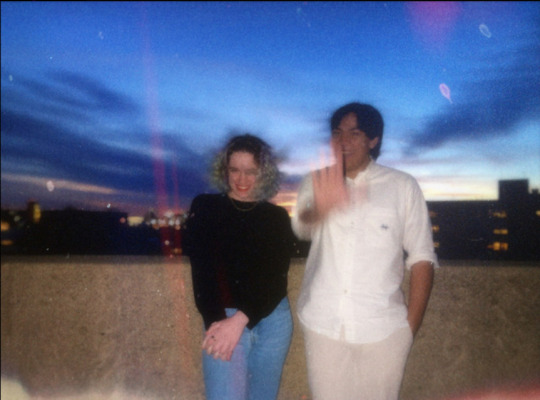
Annie Elise and Lilith Santos are The Heartmenders.
We're working on a new album right now. We're taking our time with it.
That gets me excited, because the first EP – I was blown away by that.
And that was like, those are really old tracks. Actually, I'll send you the old demos right now, I think it was on a fucking Medium article. I wrote about it in the Medium article. I do talk about the entire story in a lot more depth. I'm really glad I wrote about it. It was a really fun exercise (laughs). Yeah, it was just a fun time. It's really funny looking back at my previous heartbreak, and I don't feel so strongly about it right now. You know, it's just kind of funny knowing a time where like I deadass wrote about it, and it was so cathartic for me for no reason.
I can give you another collaborator too, which one are you the most interested in? I could do all of them.
Yeah, whatever you feel most interested in talking about. It sounds like you have a really good repertoire and a good relationships with all these people. It's cool to hear that kind of camaraderie that's there that you have with all the people that you're working with, and it sounds like a really nice community there.
Oh, for sure. For a lot of things, especially in school, the one thing I have to remind myself at the beginning was that I'm here for the school. Obviously, I'm here to make my parents proud. And it was already a crazy journey, becoming a musician, taking it seriously, and then actually going to a school for it. But the more important thing that I'm here for is the community. I mean, I've made some amazing friends. I could like, talk so much about them, you know, just how true to themselves they are, and how much they inspire me to keep working on things and do things a different way or see things a certain way. It's honestly super inspiring.
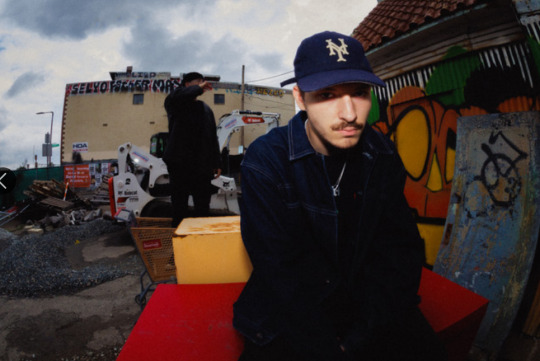
One of those people is Maz. Now, Maz is someone I met recently in the whole grand scheme of things. I became very good friends with him like a year ago. He's like one of my closest homies I ever made at the school. And we met off of a beat battle for the Berkeley Hip Hop Club that I was recommended to do when, you know, everyone was still trying to find their friends for college, their roommates, and be like, “oh, like I have this thing in common, too.” I didn't meet him there, but a friend of mine was like, “Yo you should join the beat battle. The guy who runs Berklee Hip Hop right now is judging it, and I think he would be really cool for him to see your work.” I took him up on the offer. He really liked my work!
And we kind of knew of each other, but it was really when we met in person – a lot of the stuff, especially for all these collaborations, except for one, really blossomed after meeting them in person after they're really getting to know them as a person. I'm a very social person. I try to be at least, and, you know, (laughs) it definitely shows.
Now, the funny thing is with Soul Snatchers, that whole EP was just tracks made for fun. And we somehow just worked our way into a really nice, concise circle full of ideas and such. it's just really easy to just make something, put down vocals, and then be done with it. The surprising this about this was I exclusively produced it. Another great thing about the collaboration was that I had Maz there helping me with the beat as well. Maz already is like one of the greatest working producers I know at Berklee. Like, he knows how to mix, he knows how to engineer, he knows how to experiment just enough, but also keep it in the realm of like, digestible. You know, for someone like me, that's a bit of a task! So seeing Maz do it and also being a part of his band helps too. It's amazing. And I think the main thing I got from this was that we were just having fun. A lot of the music that we make is never really that deep.
There are certain things in the production that Maz wants to fulfill every time we have a session. And whenever those prerequisites are filled up, I get to do whatever I want. So it's kind of taught me a lot about restraint. He's very set on what to do. He's very clean, thorough, efficient with it. It inspired me for my own production, just kind of honing down my process even more to like almost on a molecular level, especially for just like basic ideas.
It's really nice. I have like a mini Maz in my head sometimes telling me to make split decisions or not, and then just sticking with them until the end of the song.
It seems like from all your collaborations, you kind of picked up things from them, and you've learned from each of them. I was also wondering, for your most recent album, distant benevolence – I was struck when you released side B, because I could definitely see how you and asoookha had two distinct styles, but they kind of came together on both side A and side B.
Yeah! Ah, oh, man, ah that collaboration was a lot of fun! So they mentioned this in their YouTube description of the actual tape itself. They literally uploaded it like a day ago. In the comments, he does recall the story of when this first happened. Originally, we were friends of a friend. Shout out to TEYO. If you're reading this, what up? That kid is fucking talented. And amazing.
TEYO! on Spotify
He was the one that brought asoookha and I together. I remember hearing off of one of his tracks. I think it was "the lights dim as I live." It's a good song. The production on that was like, absolutely stellar. And like hearing that come from an 18 year old, right? Fucking wild! Like I was making stuff at like 18, but I don't think I ever sounded like that good. So I was like, okay, I had to see what was up with this guy.
I get invited to the discord server and I immediately make friends with this dude. Asoookha is awesome. We have a lot of the same interests. We're both into the same, like DJ and HoloLive, VTuber shit. It's a, it's a really funny thing to bond over. But at the same time, like our shared love for these like weird ass interests, like anime and like VTubing and like just weird fucking unplayable video games, it really brought us closer.
youtube
Youtube upload of Distant Benevolence Side B by asoookha.
And this guy's in Australia. Now keep in mind, this is not my first rodeo with a long distance friendship– I have this friend named Allanah, crazy voice actor, who I met a couple years ago over the internet and across the sea. So awesome. Like just such an awesome individual– Asoookha lives all the way in Australia, so I know how this shit works already. I know what kind of times to be up at. I know when to hit them up, when to not hit them up type of deal. And it was just really easy for us to get along.
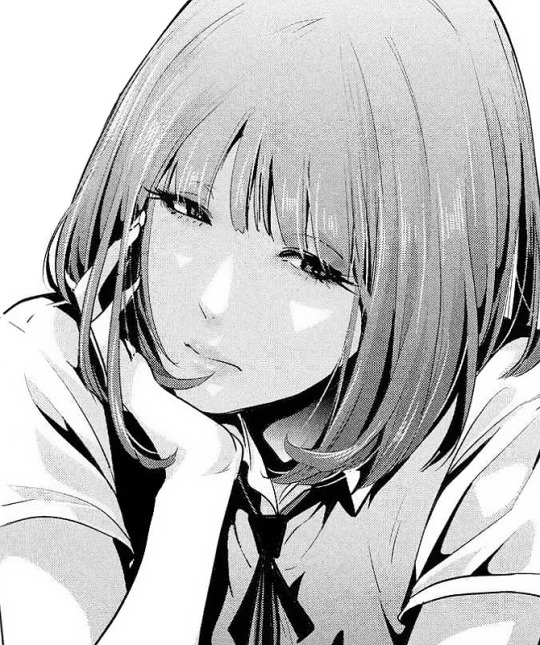
And one day, I think it was like maybe a couple of months ago, they were like, yo Lilith, do you want to just like make a collab album? That would be really funny. And I was like, as funny as that does sound, I think it would sound pretty good. So I went along with it. And I think for the entire time, asoookha was just not expecting for this to work out. Like, it was just going to be like another, like, “Oh, like, you know, we'll say we'll do it, but we're never actually going to do”, but we, we kind of came in and swept! It was such a crazy display of a two way street I've ever seen, especially from Boston all the way to Australia. We were really on top of our shit.
And that's what was like, so surprising about it. And, you know, our styles are super different. I'm very – I don't think my stuff should be perfect at all. I don't want it to be perfect. That's against my whole being as a producer, my style. Just having the weird dichotomy of like, super clean, nostalgic beats from asoookha and like this dirty but like raw and emotional stuff coming from me, it was like magical to me, hearing everything front to back. We thought about the track order and stuff together. And we just realized like, it would sound good if we just went from one emotion to the other, just like quite literally had two sides of the tape dedicated to each of us. It was kind of easy from then on.
I'm very thankful to call myself his friend. He's probably one of the craziest, talented producers out there in terms of sampling and finding stuff and getting really deep, like deep into that pocket.
I was surprised to hear “X-Wing” being sampled in one of the asoookha tracks on side B.
“video games SUCK?”
Yeah! The way he utilized Denzel Curry's vocals from X-Wing and kind of just completely flipped it.
The band [CENSORED (sorry, no sample snitching)], I think it’s a flip of them, if I recall correctly. But like, no, they're just, asoookha’s kind of crazy with it. Like they, like a lot of people just kind of slap on rap acapellas onto beats, and they’re the only couple of people that I know that can do that super well. But it surprised me to hear asoookha just threw their thing on that. Like, I mean, I don't do that a lot anymore as much as I used to, but I've been thinking about it more and more now. It's just kind of inspiring. A lot of the people I'm very grateful to. I'm so fucking grateful to be in this position that I'm in. They just kind of proved me wrong in a lot of ways. That's really all I can ask for from people! Like just prove me wrong! Show me I can do something a different way. That's really it.
I could definitely see both of your styles, there's such a beautiful synthesis on the final product. So yeah, I definitely, I definitely see the fruits of that labor.
For sure. Oh man, I'm gonna have this new whole list of shout outs right now. Shout out to Eli. Shout out to VVN. Shout out to Kyle, my boy Kyle. Shout out to Maz. Shout out to fucking Nate, man. Shout out to Quinn. Shout like, I got so many people to shout out. I don't even know if I can fit this shit in. I got so many people to thank for like, in terms of music stuff. Cause you know, it's just you know, this industry is already hard as is, as an artist being solo. Having a community just to kind of back you up and uplift you when you need it, but also being able to give that energy back and uplift that back to them: that is like one of the things I live for. Friends and family are awesome.
As for your upcoming shows, where are you going to be playing at?
I'm doing something for the Women Producers Showcase at The Loft at Berklee. It's going to be a nice little show, not too much. Then I got like a little thing going on at Bencils Live. It should be on the 18th, if I recall correctly. it's going to be like a whole 30-minute set party kind of vibes. But I'm just going to be doing my thing. I don't know. It's just going to be a bit hectic in terms of preparation. I just go by feeling to be honest (laughs).
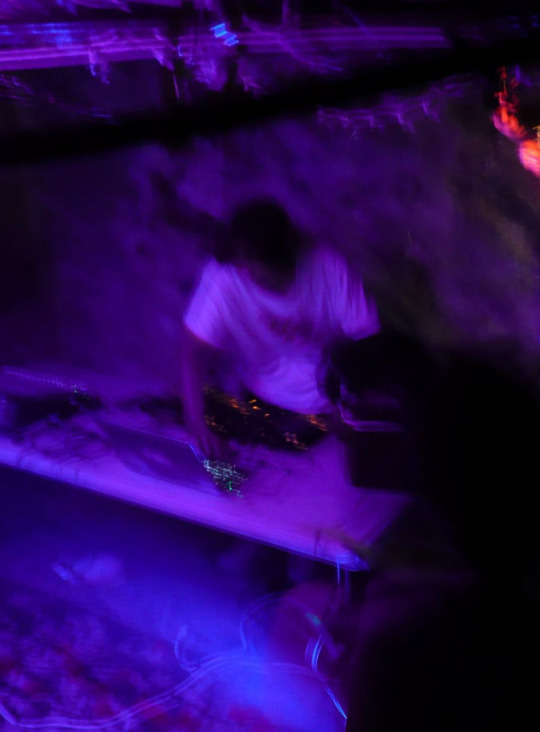
One of the things that's clear with Lilith is the sense of gratitude she has for the people she works with and have friendships with and the opportunities she's had. Lilith really values the nature of collaboration, and they've learned from each of their projects with different artists and friends.
After this point, our interview turned more towards Lilith's personal journey and their specific style. Lilith explains the significance of their artist name and their journey of coming out as nonbinary along and their personal philosophy which carries over into their personal style. Go to part two.
#nichosantosisdead#nsid#artist interview#music producer#experimental music#hip hop#electronic music#annie elise#theheartmenders#maztypebeat#asoookha#ghais guevara#music blog#music recs#music news#tunes#songs#new music#Spotify#Youtube#bandcamp#soundcloud#long post
2 notes
·
View notes
Text
Annotated Playlist: Music for a Sunset
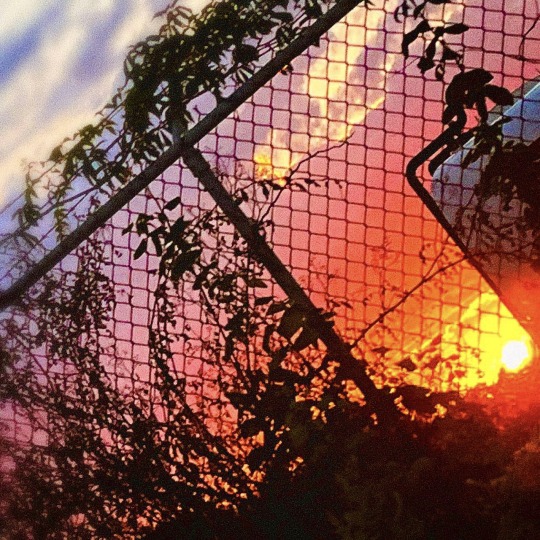
There’s something particularly striking about a sunset. Visually it’s always really stunning, the moment in the day where the sun catches our attention the most. The sunset is a kind of crossroads that we reach in the day, ending the afternoon and ushering in the night. The romanticized portrayal of the sunset in movies isn’t just embellishment – Luke Skywalker staring at the twin suns, contemplating his life as he looks out to the horizon, is a moment I think we can all relate to as we look to the future with uncertainty. Looking into a sunset is a visceral thing at times, and with that idea of a crossroads I think we use that to reflect on our day or our struggles. Despite the sun going down and it becoming the night, there’s an inspiring quality to a sunset that’s different from a sunrise. The day is ending – what are you going to do with the rest of your time today?
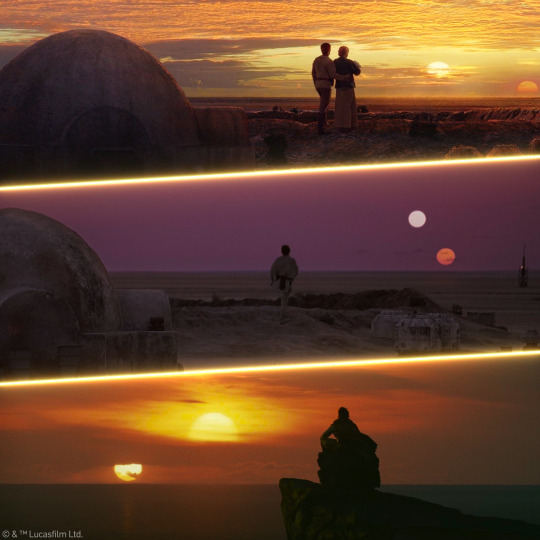
Binary sunsets!
The last few years, I’ve started to relate sunsets and the reflection point they bring to an arc of hopelessness to hope. I wanted to make a playlist to kind of capture the feeling of reflecting at this very particular moment and finding a sense of resolve despite previous failures or challenges that I haven’t overcome yet. I tried to have a range of genres in the playlist, and though the majority is rock, there’s also some jazz and a little hip hop. Some of the songs have lyrics that relate back to the idea of reflection and getting the bigger picture, and others have specific types of sounds that I’ve kind of associated with the sunset (as weird as that may sound). These include droning and reverbed guitars, or ambient background sound that breathe a sense of majesty into the songs. Some of the connections may make sense only to me and could be based on particular times I remember listening to the songs, but I think the playlist comes together in a cohesive way. I tried to cut down the number of songs to the most important ones (the original playlist is 52 songs).
The playlist on Spotify:
------------------------------------------------------------------------------
1. “Ambulance” by Blur
youtube
This song’s lyrics fit the playlist’s theme very well and it has a bunch of elements that are seen throughout the playlist. With that and the fact that it was the first track from its album, I figured it would work as the first song for this. This song feels like a weary yet resolved march onwards, one that feels both desperate yet confident. It starts with bongo-esque percussion and a deep, dark bass before the introduction of the trumpet and background chorus singing ushers in the first verse. The lyrics are simple and direct – “I ain’t got nothing to be afraid of.” Damon Albarn sings this at first like he’s trying to convince himself to keep his head up, but not entirely successfully. Then he exclaims -”’cause I love you,” and a high ambient synth of sorts cracks the song wide open. The instrumentals here are really moving, with echo-y blaring trumpets and high synths contrasting with Damon’s low yet emotive words. “I was born out of love, it’s the only way to come into this world,” with a synth stinger matching him. “I know I’m not all there, but I’m getting getting getting there.” He then says that “If you let me live my life, I’ll stay with you to the end” as the horns continue. “And I know, lord, I’m nearly there, on the surface” his voice goes high as the drum cymbals drive us into the chorus. The same lyrics from the start “I ain’t got nothing to be scared of” come back, and the song continues to rise to a crescendo of perseverance and promise. That acknowledgement that he’s not all there but he’s still going to try really works for me, and the instrumentals really add weight to this. The song cuts out all the music except the synths, and it feels like the sun is suddenly washing over after it was covered by a building before. The blaring trumpets and synths combined with deep bass and percussion left a strong impression the first time I heard the song, and it continued to grow on me as I listened to this song repeatedly. It doesn’t feel like the conclusion of a story, but instead a new beginning.
2. “Sunset” by Yuji Ohno
I first heard this song as I was looking through Spotify to find more jazz music, and this was one of the best ones I found. It helps here that it’s literally called “Sunset,” but this song perfectly captures the splendor of the sun going down. It has a delicate synth and flute intro, with a harp and other shimmering sounds before the horn, guitar and drums transition the song into an epic jazzy ride. It lets you enjoy the serene and grand atmosphere with its slow pace and energetic trumpets. High majestic strings fly in from above with their echo. The song fills up the soundscape entirely with its variety of instruments. It’s grandiose but smooth, kind of cheesy but very cool. This song always hits different, a total vibe. The definition of “majestic.”
3. “Alison” by Slowdive
youtube
"Alison" music video
I was recommended the album Souvlaki on Spotify a few days ago and this opener really hit well for me. It’s a spacey, resigned and calm bittersweet shoegaze track, immensely atmospheric. There’s something about the way the singer sings “‘cause I’m just floating,” and the tune of the song as a whole, that gives this sense of exhaustion and resignation one can feel towards the end of the day, like you just want to go to sleep. The lyrics just accept the problems, they’re too tired to change course. With its guitar’s reverb, serene vocals, and pained echoey droning coming in the chorus sections, the song has this sad, numbing quality. The droning echo cuts out as the second verse begins, the voice more present again. It’s pretty remarkable how the song’s swirling reverb builds up subtly that you only realize it once it leaves. That drone returns not long after though, and it continues until the song fades out. Sinking and drifting off as the day beats onwards…
4. “Luv(sic.) pt3” by Nujabes, feat. Shing02
The beat of “Luv(sic.) pt3” hopefully provides a fitting contrast to the end of “Alison.” I discovered Nujabes’ music from the anime Samurai Champloo, a great show that fuses Meiji-era Japan with hip-hop. Nujabes’ legendary soundtrack plays a big role in the show’s unique, lo-fi aesthetic. I have since gotten into some of his other music, and this song is one of my favorites of his, becoming very nostalgic for me. Its catchy beat and the warm, soft piano sample drew me in, and the emotional strings that enter with Shing02’s performance connected with me a lot. The instrumentals have this very emotionally present, intimate pull, with the strings loop giving an evocative sadness throughout, the tune going lower before it loops back. The production on the vocals have this sense of repetition or re-enforcement as well, with Shing02’s chorus being repeated: “It’s funny how the music puts time into perspective, add a soundtrack to your life and perfect it. Wherever you are feeling blue keep walking and we can get far, wherever you are,” The way that the next repetition comes directly after the previous line adds a certain emphasis on the chorus and that line “wherever you are,” as well as the way that Shing02 says it. That line for the longest time was the only part of the lyrics I paid much attention to, but as I made this playlist, I gained a new appreciation for them. I initially thought that the song initially just had a romantic focus, but when I actually listened to them I got a better understanding of the more broader yearning for satisfaction and the introspective focus, with the speaker wanting to re-contextualize his life as he looks back. He wants to “add a soundtrack to [his] life” and “perfect it” in order to move forward and persevere. The music in this sense matches that so well, with the persistent strings loop giving weight to that strive.
5) “Us and Them” by Pink Floyd
This is one of the songs from Dark Side of the Moon that I heard for the first time this year as I finally sat down and listened to the whole thing on its 50th anniversary year. I really like the guitar tune and the saxophone in this song, along with its epic chorus sections. The song feels like a culmination of sorts, epic and definitive in its sprawling statement on our collective self-centeredness. It’s on the other end of the spectrum from the very personal lyrics from “Luv(sic.) pt3.” I think it’s this self-reflective focus, the saxophone and that chorus that make me associate this with an arresting sunset (I’m honestly not entirely sure why saxophones have that association for me). I had some trouble determining if I should put this song or “Time” here, and though Time's timeless (sorry about that) lyrics are very fitting here, the grandeur of the scope of "Us and Them" made me associate it with the sunset more. With this song, the playlist becomes more melancholy.
6. “Kodoku” by Hideki Taniuchi
Death Note was one of the first anime I watched, and I really enjoyed it for the complex and addictive cat-and-mouse story and its overall aesthetic. It has a great music score from which I have a lot of my favorite soundtrack pieces. It’s very versatile in the sense that it alternates between eerie and epic orchestral, emotional synths, and grungy emo alternative rock. This track is the latter-most, and was probably my introduction to the shoegaze and alternative sound, as weird as that is. It starts quiet with one guitar, and then another trickles in as it distorts and turns into a constant background drone. The main guitar tune and drum beat is a tired, world-weary cycle that goes lower, up again, and back down. It continues as the drone builds and the drums slowly escalate. Then there are five drum beats and the shrill distorted guitar becomes isolated before the drums and main guitar return with resounding, devastating force. The “chorus” is bombastic and supremely sad. The same main guitar cycle continues but louder than before, as if saying that things can’t get better, while the distorted drone blares, as if screaming as if in despair. This is the remainder of the song, and it’s depressing but kind of comforting. This is when my sunset contemplation playlist turns into wallowing.
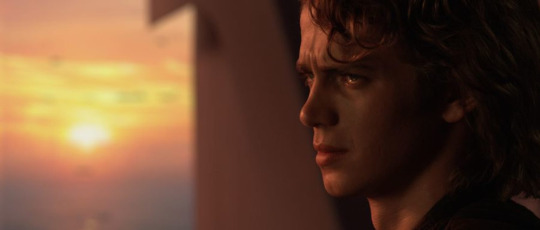
Another Star Wars sunset!
7. “Fake Plastic Trees” by Radiohead
There are three Radiohead songs on this playlist, and even more on the longer playlist, but I think I controlled the impulse to have too many songs from just them on this one. “Fake Plastic Trees” is a song that grew on me over time. I initially didn’t listen to much of The Bends stuff and only over this summer I finally listened to the album properly, it’s really good of course. This song especially holds up super well, it’s very direct and straightforward in comparison to their later material (which I equally like). The song builds to a powerful climax the way “Kodoku” does, but with the added weight of Thom Yorke’s impassioned singing and haunting words. The song feels cathartic in its accompanying strings, ambient organ, acoustic and also heavy guitars, and clashing cymbals and drums. Like Us and Them this song has a more broader focus with its lyrics. As Jim Beviglia in American Songwriter discusses, the song critiques materialism and asks for real relationships, but there’s also an extremely personal strive to make sense of the situation (Beviglia points out some really interesting aspects in the lyrics, like a joke about plastic surgery and using the language of commercials). And there’s a crippling feeling of inadequacy at the end as the speaker is also caught up in the superficiality of it all. “If I could be who you wanted…all the time…all the time.” We’re looking inwards, and we're stuck in a rut.
8. “A Quick One Before the Eternal Worm Devours Connecticut” by Have a Nice Life
I talked about Deathconsciousness in a previous post, very depressing album (but also very good). I think more than any other song on the album this one suits the tone of this playlist, a lot of the others would have been too extreme. I feel like there’s also some connective tissue with “Fake Plastic Trees” chord(?)-wise but I don’t really know much about music theory so I can’t really speak more on that. I think the song is good practically to listen to while watching a sunset, very soothing with its acoustic guitar and droning noise, which at the same time feels anguished and in line with the eerie synthetic notes too. The song could’ve been just some instrumental ambient piece, but it keeps itself immensely emotionally engaging. It’s a mix of bittersweet recollection and tired acceptance with a haunting undertone (now I’m really scared that this is just a nonsensical word salad). This is one of those songs where it feels a bit like staring into the abyss if you listen to it on repeat.
youtube
This song is depressing but this Super Mario 64 soundfont cover by @aldendwyer is really cool and well made!
9. “How to Disappear Completely” by Radiohead
youtube
Like Luv(sic.) pt3, “How to Disappear Completely” (I’m abbreviating it as HTDC) is one of my favorite songs of all time, it’s my favorite Radiohead song. It was one of the songs from them that I heard by chance before I really knew much about them. I also adore the strings-only instrumental version they released in Kid Amnesia “How to Disappear into Strings,” that adds another dimension to the song on its own. HTDC is another song here that’s simultaneously distressing and soothing, but this one has an emotional power that to me makes it the most emblematic of that feeling of suddenly being at a crossroads. I was 100% sure I wanted this song on this playlist because of how much it has informed my understanding of the hope-v-hopelessness dynamic, even more than the band’s other songs or the previous songs in the playlist.
youtube
HTDC stands out in its various layered emotions and instrumentation, along with Thom’s haunting words. There’s a great video from the Youtube channel Listening In that does a super intricate breakdown of the song from a writing perspective. One of the things the video does really well is characterize the different sounds of the song, my favorite of which is how he describes the electric guitar as “ethereal and diffuse.” Ethereal, especially, describes this song in a nutshell. As Listening In explains, there’s a dissonance in the strings combined with the warm acoustic guitar and gentle bass line, and through these elements the song creates an unparalleled sense of a crisis, a point where it’s just too frustrating to handle any longer. The music tries to comfort as the vocals repeat “I’m not here, this isn’t happening,” but the strings continue to escalate and overwhelm that. There is no escape, it seems. The song’s soaring climax is Thom’s voice trying to break free, his voice matching the electric guitar’s distant cry. At first it seems to work. Then the strings’ disharmony explodes out of control, until the voice finally comes back on top, the strings becoming a signal of triumph at the mountaintop, finally coming to terms with the stress. There’s a question of if the song is embracing the notion of “I’m not there, this isn’t happening,” which at least for me is kind of scary in that it could lead to resignation and numbness, the kind that’s there in “Alison” and “Kodoku.” That doesn’t sit well with me. What is the point of sad songs like those if we don’t move on from there? Why indulge that? HTDC still resonates with me immensely, and it’s because of that suggestion of hope at the end. The song starts from the greatest crisis and concludes giving the possibility of real contentment. But it isn’t enough for me to just end with that and be stuck on this song. I would still be stuck in the ditch.
10. “Dust in the Wind” by Kansas
This is another all-time favorite of mine and one I have immense nostalgia for. My uncle has a CD of a bunch of different great songs across decades, ranging from classic rock like The Doors, Pink Floyd and ELO, later stuff like Bon Jovi, Journey, then Nirvana, and even contemporary stuff like Brittney Spears. “Dust in the Wind” is one of the songs from this playlist (along with “Carry on Wayward Son" also by Kansas), and I have very specific memories listening to this in the car with him, my cousin-brother, and my sister. If HTDC is an intense voyage in the throes of a crisis, “Dust in the Wind” is a sober reminder of where we stand. On one hand it might seem like this song is awfully depressing, but it’s actually rather reassuring, a simple and true reminder to take a step back. The bittersweet acoustic guitar and confident violin solo before a final chorus makes me feel content in the truth rather than distressed. HTDC and “Dust in the Wind” come from opposite approaches to create equally moving moments of epiphany. This song’s tone of contentment towards our overall situation acts as the newfound stable footing that allows us to continue.
11. “Weird Fishes / Arpeggi” by Radiohead
youtube
"Weird Fishes / Arpeggi" fan-made music video that Radiohead uploaded.
“Weird Fishes” is another one of my all time favorite songs and my third favorite Radiohead song. It’s similar in some ways to HTDC in that the lyrics are trying to find a way up from the ditch, but the desperation of Weird Fishes is an infectious yearning “from the bottom of the sea.” The fast drum beat is coupled with the calm, lush yet searching guitar tune. It captures that fundamental aspiration of something more from the horizon. “Your eyes. They turn me. Why should I stay here? Why should I stay?” It’s such a simple question, one that hits me hard on some listens. As the song progresses Ed O’Brien’s backing vocals give voice to that passion, a cry for happiness that Thom then matches, the beautiful guitars, the drum beat momentum all match, "this is my chance” until– “I get eaten by the worms.” The tragedy to the song is that the thing we’re chasing that gets us out of the rut is often a phantom all along. It may never end. The song doesn’t stop on that though. The bass takes central focus, and different elements swirl and rise up again as Thom says “I hit the bottom, I hit the bottom and escape.” He keeps on going. There's something really moving about that to me.
youtube
@on4word makes really exceptional soundfont covers, with great artwork and puns to boot.The creator re-did the entirety of In Rainbows and OK Computer along with a lot of songs from other artists too. The production work and creativity is honestly incredible.
12. “Kiri” by Monoral
youtube
I first heard this song from the anime Ergo Proxy, a post-apocalyptic sci-fi show. It has a kind of emo vibe – one of the main characters quite literally looks like the Evanescence album cover, not even exaggerating. The show’s intro sequence really caught my attention. It had a muted, cloudy backdrop with decaying industrial features, its main character lit by the yellow cloudy sky. This opening and the song in it, “Kiri” by a Japanese group called Monoral, had an aesthetic that kind of influenced the whole concept for this sunset playlist. The actual show had an interesting concept but never really lived up to its potential, unfortunately.
youtube
Cool concept, bad show, great OP.
The song "Kiri," like many others in the playlist, conveys a sense of desperation, but it's instrumentation and the vocals convey a kind of resolve and hope that I really appreciated. It starts with a guitar, and introduces a deep bass and background droning that is one of my favorite elements of the song. The drum comes in with the lyrics: "you complete my fate." There's a Christian undertone to a lot of the lyrics, like "the halo crawls away" and later on "the heavens stroll inside of me" and "believe in me and drink the wine and take my hand...." It’s an interesting layer to the song, and it’s cool in that I think that you could take the lyrics in a more general sense too if you wanted to. I was drawn to the underlying optimism of the song as the chorus unfolds with the lead singer exclaiming: "come and save me," with the droning matching the voice's pleading. The show’s opening sequence pairs a dark yet enchanting sunset sky with the rust and grime of the post apocalypse. As the song ends with the singer presumably taking on a different, reassuring voice, there's a sense of fulfillment. The song in general still comes from the perspective of yearning for saving, but I now am given a level of faith that things can get better.
13. “Modal Soul” by Nujabes feat. Uyama Hiroto
youtube
I remember finding this song around the same time as "Luv(sic.) pt3," and I really enjoyed the serene but lively vibes of this. Considering the more hip-hop genre of Nujabes' other songs I wasn't expecting this jazz piece. There's a really nice texture to the percussion, and the main horn tune leads me through the song, which transitions to piano taking the focus. There's an ambient sound in the song which creates a really interesting aura and fills the soundscape. This song is perfect for a car ride at sunset with the windows open (that was the most memorable time I listened to the song). Listening to the song at any time in the day, I visualize a sunset. At the end of the day listening to it makes me feel a sense of satisfaction and fulfillment. It's not the same kind of grandeur as the Yuji Ohno track from earlier, instead more subdued. The rich sound of the song makes me feel content.
14. “Spring Day” by BTS
I don't listen to much K-pop, and I know some of BTS' music from my sister when she was really into their music. They're a good band though (my sister is right that their English songs are much weaker), and the song "Spring Day" has continued to stand out to me even long after I heard it for the first time. The song is incredibly bittersweet. My sister explained the meaning of the song once, that it's about coming to terms with the loss of a friend, that they'll meet again and spring will one day return. I've also heard that it addresses a ferry disaster incident in 2014. Lauren Kranc wrote for Esquire that although the specific event the song talks about is vague, there were a number of indicators that the song has some association with the Sewol ferry incident, which saw the deaths of 304 passengers (majority being high school students) and caused a large backlash in South Korea, This is definitely backed up by the music - the song begins with its signature synthetic tune with piano. The first verse keeps the synth in the background, but then it comes to the forefront of the bridge as the beat falls away and starts building up for the chorus. The song's chorus is incredibly cathartic, the synth tune acting as an expressive drone in a bombastic peak, and the sudden accidentals into minor from the hushed vocals always seem to catch me vulnerable. The song's rap sections don't work quite as well for me just because I don't know the lyrics that well, but that's just the overall insignificant byproduct of a language barrier. Although the song seems to talk about some kind of difficult loss, the emotion of the music gives the reflective nature of it a very earnest quality that conveys a particular feeling of closure to me.
------------------------------------------------------------------------------
Conclusion
I think what I want to say with all this has less to do with trying to make a thesis about anything and more about seeing the kind of arc I ended up making as I made a playlist. Sunsets are cool but I like engaging with the emotions that different songs elicit and how they relate to each other. I often found myself coming to terms with different ideas from the songs. Some songs like "Alison," "Kodoku" and "Earthworm" seem to have a very dejecting view, and when I listen to those songs enough times it makes me question what the point of listening to them is when they are sad like that. I felt the need to put them in a context that ultimately makes me not want to linger too long on the dark feelings conveyed from them, and it turned into an inspirational story of sorts that I hoped would be true. I find myself being annoyed at the cycle of trying to get motivation only to squander it by getting distracted and procrastinating. That procrastination makes me frustrated at myself on a deeper level, which doesn't help me actually get out of the rut I'm in. This frustration and my thoughts about it definitely guided how I made the playlist.
I was ultimately more concerned with those things as compared to the functional listening purpose of the playlist. That being said, with HTDC aside due to how heavy it is, I think all the tracks here are good driving songs and fit for anything at sunset. There are aesthetic similarities between them in terms of genre and the sound (like droning) that hopefully makes these enjoyable songs a cohesive listening experience and also a non-repetitive one.
Something I realized towards the end of this is that the two songs that ended up being the most important “resolutions” for the playlist were “Dust in the Wind” and “Spring Day,” both being songs that I have a family connection to. The meaning I take from “Dust in the Wind” is very colored by the fact that I grew up listening to it and thus took its message more to heart than I might have hearing it now. And in general, both that song and “Spring Day” have greater emotional value to me because I associate them with my family.
Below here is the original long playlist. It’s quite big but it has a lot more variety, there's more of each genre or vibe of the 14 tracks above.
#playlist#sunset#music blog#music discourse#music discussion#rock music#indie#music#rock#jazz#shoegaze#nujabes#radiohead#blur#slowdive#yuji ohno#pink floyd#monoral#have a nice life#deathconsciousness#bts#kansas#youtube#star wars#binary sunset#death note#ergo proxy#on4word#Spotify#Youtube
0 notes
Text
The Live Energy of The Smile
youtube
The Smile 7/11/23 Cleveland Live Show, taken by @ryanj65 on Youtube
I’ve gotten really into Radiohead this past year or so, and as I’ve been going through their discography I’ve also discovered Thom Yorke and Jonny Greenwood’s side project with Tom Skinner, The Smile. At first I wasn't fully vibing with it. I got the impression that they wanted a very different style with this project’s debut album, A Light for Attracting Attention, but nothing initially captured my attention off the bat, so I didn’t give the album a proper listen. But this changed after I listened to a live performance of one of their then-unreleased new songs, "Bending Hectic." That blew me away – it starts as an incredibly lush, calm, meditative tune with a curiously off-kilter twist in the guitar, and eventually it leads into an unexpected heavy metal climax. It hit me differently, and it made me go back to the studio album and reconsider it. Bending Hectic is the song that made The Smile click for me, and I appreciated the studio album more. The low-key jazziness really clicked, and I really appreciated the album’s emotional and direct songs like “Speech Bubbles” and “Free in the Knowledge,” my favorite from that album. I also really liked Tom Skinner’s drumming, his jazz background really helps contribute to the album having its own identity.
youtube
Studio release of "Bending Hectic"
youtube
"Free in the Knowledge" from A Light For Attracting Attention
I still felt that there was something interesting though in the parallels between Radiohead and the Smile. When I read different perspectives about the album, one thing I saw someone talk about was how Nigel Godrich’s production on A Light for Attracting Attention contributed to there being a similar feeling between the two projects. Though I forgot where I saw that exactly, it was likely on Reddit when Bending Hectic got a studio single release. It was produced by a different person, and on this post there was some discussion about the more “live” or “present” sound that was there compared to Godrich’s production style, and this got me interested in what The Smile’s live performances would be like. I really wanted to go to one of their shows during their North American tour this summer, but unfortunately wasn’t able to. I decided recently to watch one of their performance recordings, and I was lucky to find a really high quality video taken by @ryanj65 of their Cleveland performance on July 11. It was through listening to this live performance that I felt how free and playful this band is with their music, and their “garage band” aesthetic really shined.
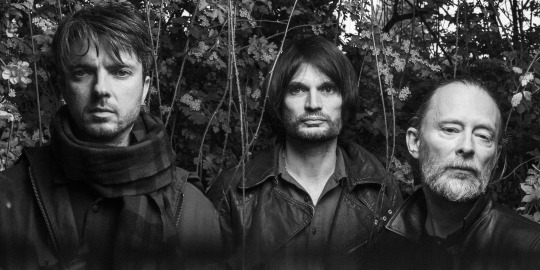
Tom Skinner, Jonny Greenwood, and Thom Yorke
Tom Skinner’s drum performance is one of the best things about this project. He brings a free-flowing yet intricate and versatile style that, like I said earlier, shapes the identity of many of the songs here, not to mention the band as a whole. It's a different vibe than the drum work of Radiohead’s equally talented Philip Selway. Skinner’s jazzy drums lends itself naturally to a more acoustic sound, but what’s interesting is how the band melds that with synthetic sounds. This is something that the studio album does really well too. In Spectrum Culture’s review of “A Light for Attracting Attention,” Aaron Paskin writes that “The jittery poly-rhythms of The King of Limbs are given new life by Skinner’s masterful drumming, and their pairing with tasteful horns and woodwinds and exquisite strings complete the picture sketched by Radiohead’s flawed eighth album. “The Opposite” is a prime example, with swirling vocal distortions and a vicious guitar riff grounded by an irresistibly groovy beat. The track is downright frenetic, but Skinner holds it all together with ease. He plays a similar role on the equally groovy but slicker ‘The Smoke,’…” Skinner complements the rest of the music really well and grounds it perfectly while also being complex and intricate himself.
Seeing this come together on the stage was something else. “Thin Thing” turns from an intricately woven fast paced track into a roaring, pulsating beast, with the dissonant deep guitar jolting forward dangerously. Their rendition of “A Hairdryer” conveys this energy the most. It starts with a fast keyboard tune, Jonny Greenwood playing the bass guitar with a bow to create a low screeching sound, and Thom shredding while Skinner plays a cycle of energetic drums. Thom sings the echo-y vocals that were background vocals from the studio version. This is an operatic, wild version of this song, feeling chaotic but all the elements combine to create a singular atmosphere before Skinner transitions into the fast drum beat with finesse and the main tune comes in. The vocals from just before were live looped – they now come in as proper background lyrics as Thom sings. The same keyboard arpeggio from the beginning comes back at the end of the song, adding to the kind of floating sensation the song has. There are times where Thom’s singing falters, and in general his singing during live shows for The Smile and Radiohead can be really inconsistent. It was one of my main worries when I was still hoping to actually see them live. That being said, the experimentation and different approaches they take to these live versions is still always very rewarding to listen to. It’s these kinds of alternate variations of their songs that I really like about The Smile, because they fit the core of the song well and exist nicely alongside their studio versions. In cases like this rendition of “A Hairdryer,” their music feels more alive on stage than from the studio.
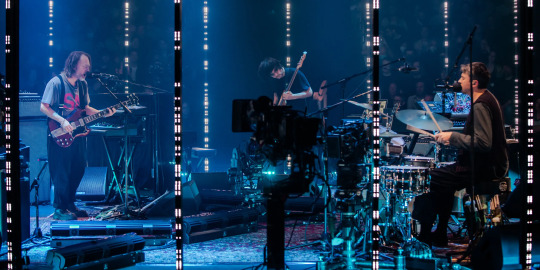
We see this energy in the band members too. The show here is cool in how it’s primarily just focused on the music itself and less on the personalities of the performers, but the playful way Thom introduces the new song “Colours Fly” adds a nice bit of stage presence. The song introduces Robert Stillman's excellent saxophone for the second time during the show, and it features Jonny’s guitar squibbling and Thom’s voice twisting. In the middle it starts rising nervously with Thom’s “no no non no no’s” being repeated with reverb with the live looping, creating a hypnotic effect. The drums and bass here are really good, and Jonny using the guitar with a bow again works really well here. While they play “The Same,” he’s jamming out to the synth and pounding syncopated beat and piano. Thom’s bass comes in in the second half, along with more electronic phasing and whirring that gives the song a different kind of momentum compared to the studio version. I like both equally in this case, but it’s cool how they build on the base of the song and play with new elements. That whirring especially is something that I really like about this rendition. Again – even with their synth songs, that playfulness comes through. This album opener comes at the end of the set, which has a different feeling, as if Thom’s sentiments in the lyrics feel like a conclusion and summation compared to an opening plea in the album.
The connections between the pieces in the set overall are interesting. They introduced a new song called “Under Our Pillows,” which transitions well into “We Don’t Know How Tomorrow Brings.” “Under Our Pillows” feels like a sequel to the album track "Thin Thing,” a fast paced song with immense finesse in the guitar and drums. The chorus has similarities too. This feels pained and anguished though. Then it slows to a pause, with just the drums. It starts to rise up, building momentum steadily. Thom’s vocals feel a little like a lullaby. Thom uses live looping on his vocals to overlap with the words he sings, creating an interesting surreal, somewhat drunk-sounding effect as the song slows again and spins slowly to a stop. When “We Don’t Know What Tomorrow Brings” comes next, its own rousing and energetic nature, with its deep synths and cymbals crashing, combined with the previous song creates a satisfying crescendo.
youtube
A remaster by @MajorMajorSeven of the Teleharmonic performance that Ryan J captured.
One of the other unreleased songs that they played was “Teleharmonic," which was one of the songs I was looking forward to the most after hearing a previous live version. It starts with a droning synth and acoustic guitar from Thom, very emotional and direct. There’s a sense of catharsis and assured-ness to this piece once the slow (bossa-esque?) drums come in, they have a distinctive sound, it’s a nice groovy vibe as Thom sings. Suddenly, a totally stunning bridge with just rapid cymbals with ambient synth that fuses with the expansive heavy reverb guitar, and then the introduction of a deep, groovy powerful bass line that transitions into the main verse. It’s ethereal. I was surprised because compared to when I heard this song for the first time from another live version, this bass comes in just a little later, but this fits the climb of the bridge more. The saxophone in this version is another improvement. I’m really enjoying how this song is evolving and I’m really looking forward to how it turns out in the studio version for their second album. Overall this song is extremely cathartic and wears its heart on its sleeve. It’s especially clear from their live performances like this one that this project is a group of expert musicians at the top of their game giving us a more low-key and playful experience, with their songs feeling like the polished product of enthusiastic and fun jam sessions.
The intro to their encore shows really well The Smile’s motivation to give a unique auditory experience, giving a lush keyboard and synth soundscape as they begin playing “Open the Floodgates.” The combination of these elements with the piano and guitar in this live performance create a fresh combination of electronic and acoustic that is emblematic of The Smile’s music as a whole.
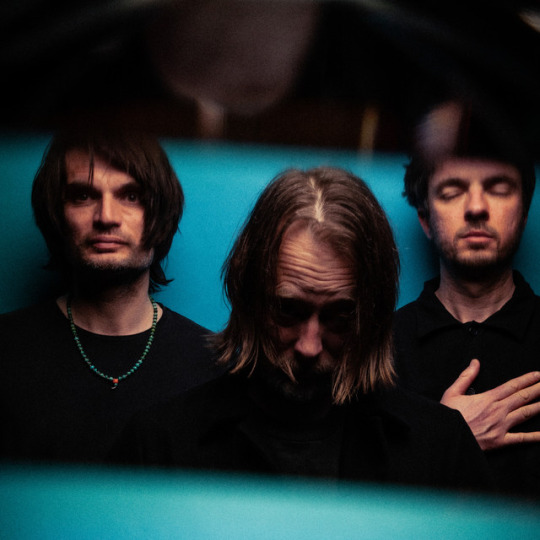
Setlist:
Pana-Vision
Speech Bubbles
The Opposite
A Hairdryer
Waiving a White Flag
Under Our Pillows
We Don’t Know What Tomorrow Brings
Colours Fly
Thin Thing
Teleharmonic (unreleased)
Skirting on the Surface
The Same
Read the Room (unreleased)
The Smoke
You Will Never Work in Television Again
Open The Floodgates
Encore:
People on Balconies (unreleased)
Bending Hectic
Feeling Pulled Apart By Horses
#the smile#radiohead#thom yorke#jonny greenwood#tom skinner#jazz#rock#indie#indie rock#rock music#electronic music#live music#music blog#music#new music#music discourse#music discussion#Youtube#Spotify#long post
2 notes
·
View notes
Text
Droning into the Abyss: Blind Review of Deathconciousness by Have a Nice Life
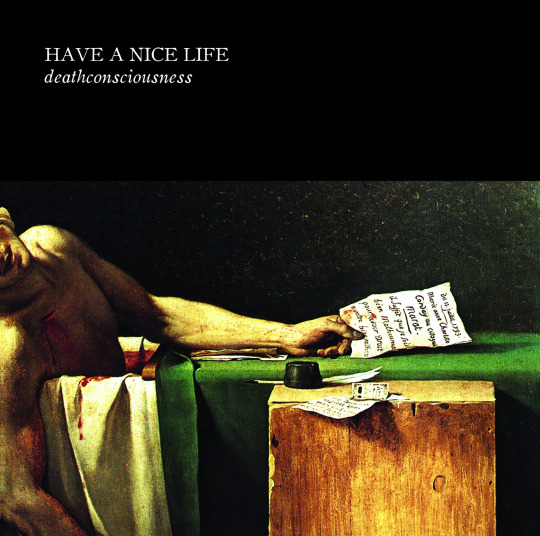
This is a (mostly) blind review of Deathconsciousness by Have a Nice Life. I’ve seen the album recommended to me on Spotify a few times for a while now, and I decided to finally give it a try. I’m not familiar with the band, and the only song I’ve heard from them is “Bloodhail,” a dark electronic rock track from this album with a memorable drum beat that’s there throughout. It surprised me then when the album started with a gorgeously sad, delicate instrumental acoustic guitar piece with anguished droning filling the soundscape. The song, “A Quick One Before the Eternal Worm Devours Connecticut” has a title that's pulpy but also casts the quiet sadness of the music with a deeply haunting and apocalyptic sense of acceptance. From there the anthemic and trudging beat of “Bloodhail'' provides a good contrast. Even still, the general tone of the song continues the despair from the last one. The singer yells as he pleads “Can’t you see it’s all flown out of my hands?” and the reverb of his voice echoes out. The low bass and continuous beat is a constant throughout most of the song, anchoring the vocals and fuzzy guitar with a sense of darkness. Towards the end the singer repeats the same line again again until the bass cuts out at the end, with the beat and echoing voices layered on top of each other leaving a sense of helplessness as the last word echoes out.
In the beginning here I’ll get my only issue with the album out of the way. I felt that in some tracks the instrumentals feel like they’re drowning out other elements, that the vocals or main tune feel too faint to fully follow the song. The vocals are often mixed low or fuzzed out, and there were a few times that I was distracted by this. That being said, there are many other times that this works really well, creating a sense that I was floating in a sea of noise. The prominent guitar droning in so many songs never feels like it’s just there without a purpose because of how it's built up over the tracks and contrasted with quieter moments. Each song never gets stale or repetitive – In “Hunter,” for example, the drum picks up at the right time here, just when it felt like the song was lagging. The shift in the chorus in the song “Telephony” works well to switch up from the repetition before and make the next verse feel interesting again. That well-executed contrast makes the songs sound dynamic.
This dynamic property can be seen with the sequencing of the album as well. Each song starts in surprising and unexpected ways following the previous one, giving a new unique vibe while also keeping consistent with the overall aesthetic and sound of the album. The overall order of the album is perfectly done, providing a clear emotional arc. I read Vice’s interview with Have a Nice Life (the band’s two members being Dan Barrett and Tim Macuga). When I saw that the album was structured as a double LP with two disks, I realized that this was definitely reflected in my listening experience. “Who Would Leave Their Son out in the Sun” and “There is No Food” into “Waiting for Black Metal Records to Come in the Mail” felt like a transition period musically, with the former two coming to a pensive and disturbing pause before the latter one introduces a shift in style and tone. “Waiting for Black Metal Records” is a cool song that doesn’t outwardly fit with a lot of the other songs, so it works really well placed at the start of the next stage in the album.
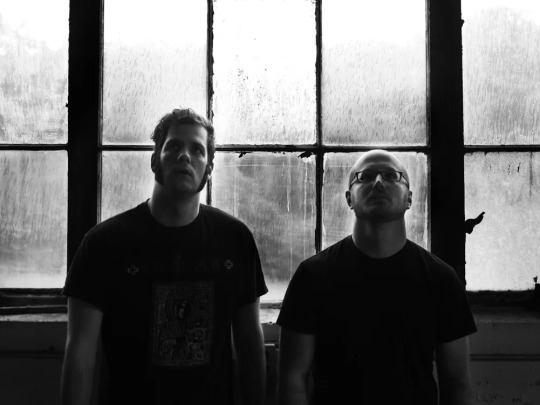
Dan Barrett and Tim Macuga
Overall, Deathconsciousness has an oppressive sense of despair, its droning guitars dragging us against the concrete ground. Multiple songs convey the atmosphere of a hostile apocalyptic plane. The foreboding deep strings in “Hunter” feel like the announcement of a coming storm. I was reminded of the soundtrack of Terminator. (Telephony continues those Terminator vibes with its high synth and heavy echo drums, creating a palpable sense of danger). The third song, “The Big Gloom”, has a wall of droning noise that doesn’t let up. But at the same time though, we hear the emotion in the singer’s defeated voice. The song creates a bittersweet sense that good times have ended, but it also has a sense of appreciation as well. A later song near the end, “Deep, Deep”, feels like a great energetic climax to the album, surprisingly. The pounding drums, jagged but spirited guitars and high synths in the chorus giving a feeling of making it through the bloody battle triumphantly.
Sputnik Music’s review of the album talks about this contradiction, saying about "The Big Gloom" that it "does exactly what its title implies. It's a shoegaze epic that is as beautiful and uplifting as it is dark and oppressive.” The writer continues to discuss the duality of the album, something that I also felt while listening. “Who Would Leave Their Son out in the Sun?” feels like a church choir distorted by the drone and echo, making the already distressing tune from the guitar feel even more eerie. It feels angry, seeming calm and angelic before going deep and harsh, then back again. “Holy Fucking Shit: 40,000” brings in a metronome sound of sorts and an evocative piano, with clearer vocals informing the tune. The piano really stands here and adds a lot of deep emotion to the track. The second half then gets muscular with a sudden heavy distorted beat and roaring electric guitars building the momentum. The bombastic and emotional final song “Earthmover” is the most memorable example of how beauty clashes and blends with harsh droning and disturbing deepness throughout the album. The song shifts from delicate to an intense wall of sound, back to an intimate place with an echo to the heavens, and then a long drone until the end that I’m unsure was reassuring or discomforting. All throughout the track a heart-rending tune is maintained before it's finally overwhelmed, giving a sense of resolve, then tragic beauty before ending.
I’m unsure whether this album’s final outlook is one of hope or resignation. An interesting review from Medium.com says this about the album, making an interesting note about how depression relates to it: “When you have depression, all your other emotions get mashed into a sort of detached empathy. The most powerful emotions barely even register as a blip. Your brain endlessly pummels at you until all you feel is nothing. Deathconsciousness perfectly captures that feeling, and somehow manages to find beauty in it.” The kind of ambiguity here doesn’t sit with me entirely well. However, the band's authenticity in its expression of this particular feeling is ultimately very satisfying and cathartic, unlike anything I've heard before. This is an album I definitely plan to revisit.
#deathconsciousness#have a nice life#music blog#music#music discussion#music discourse#rock music#shoegaze#indie#post rock#industrial music#ambient#alternative#Spotify#long post#experimental music#music review#album#album review#album recommendation
1 note
·
View note
Text
What to Take From Roger Waters' "Time" Redux
I’m a huge fan of Pink Floyd’s music and I love Dark Side of the Moon. It's a big year for the album, as a lot of people are celebrating its 50th anniversary this year. Pink Floyd released a remaster earlier this year, but Roger Waters (former Pink Floyd bassist and songwriter) has announced a "redux" of the original album as well, and not with the Pink Floyd members. I previously was not all that knowledgeable about the relationship between Roger Waters and the current members of the band. I had a general understanding of his role while in the band and knew that he and the band aren’t on the best of terms even now. I’ve also heard about his controversies regarding antisemitism and the Ukraine War. All this is to say that this made me very skeptical when I heard that about the redux. Is this really necessary, and is it motivated to be a sort of “fuck you” to David Gilmour and the others?
To Waters' credit, in his announcement he talked about how he wanted it to complement the original, not supersede it. He praised his work with his band members making the original, and said that he wants to gain something new from the concept and ideas of the original album. NME cited him saying in a press release that "...I started to consider what the wisdom of an 80-year-old could bring to a reimagined version." I was morbidly curious what this would be like, so I decided to take a look into the single for Waters’ version of “Time,” which he released last month. The original version of "Time" is one of my favorite songs of all time. I’ll admit that I went in cynical, but I tried to be open minded when I listened to this re-interpretation. Ultimately though I came out not too impressed, as the overall approach in this version seems to dampen its own potential to really distinguish itself from the original.
Here’s the new song: https://youtu.be/NcEHCVLMjAU?si=7uzb328PNX_du_OJ
youtube
In case you haven’t heard the original: https://youtu.be/Qr0-7Ds79zo?si=JJxUL7xPUMycPLuU
youtube
The main characteristic that many articles (like the NME one) have noted about the track is its atmospheric, low-key approach, drawing us in as we hear the straightforward spoken word introduction. “The voice had been there all along. Hidden in the stones in the rivers. Hidden in all the books. Hidden in plain sight. It was the voice of reason.” These new lyrics tie well into the theme of the song, time creeping up on you. It speaks to that new perspective, an older one who’s being reminded of the original’s message, truly closer to death. It’s quiet, just the deep piano and singular drum beat. Then comes in an acoustic guitar, piano and ambient synth. It elicits a more straightforwardly emotional tone, which I’m liking. The original version is more bombastic and it plays like a heightened version of the sadness that this song is trying to be more grounded in its focus on. The original felt elemental, primordial, speaking to eternal dread persisting infinitely, and this new version seems like it’s trying to make a more personal version of that.
Then the four drum beats together hit like how the original song did in its transition into the first verse. The bass and a slow drum beat are mostly all that’s accompanying the first verse, and there’s an occasional eerie piano that I really like. Low strings build up to the chorus, where the effect of double vocals on the production add the sense of a sober yet kind of hypnotic limp onwards. The words carry more weight with this, as if they’re echoing in the mind as time weighs down on you. The low strings are effective in emphasizing the sullenness. As the chorus ends and goes to the instrumental section, an organ and ambient high pitched synth of sorts joins in, and then another synth and strings add a level of contemplative sadness that’s unique. The organ seems to call back to the old times, it reminds me a bit of “House of the Rising Sun”.
But this instrumental section here doesn’t expand enough before returning to the next verse. When it went to the next verse, I didn’t feel the contrast that much, and it kind of blends together. The next verse’s more energetic violin feels out of place for the tone the song is trying to establish. I don’t want to suggest “what they should have done,” I’m not claiming any expertise, but as I kept re-listening to the track I felt myself wanting the instrumentals to build up more in some way. I like that they died down as Waters says “sinking,” emphasizing that word. At the same time, the music stays lower than the instrumental section for the rest of the song, so it feels like the build up from that instrumental section didn’t have a satisfying payoff. And when the strings and synth die down for the “Home again” verse, it doesn’t feel like there was a big enough contrast for that to have the seductive comfort that the original’s “Home again” had.
The goal of this redux seems to be staying low-key throughout, but that just feels like a detriment to the emotions this was trying to convey. One of the most impactful parts of the original song was whenever the big operatic vocals came in as the drum beat changed to a slower one. There, it felt like you were floating in slow motion, and the tragedy of time’s passing felt more impactful. That song feels dynamic in its different drum speeds and hard and soft parts. Despite being sung by an older man and with the same drum speed throughout emphasizing the hypnotic passage of time, the ambient instrumentals and strings of the new song feel constrained when they could have really had an emotional, raw sense of powerlessness. The vocals are kind of similar throughout as well. They work really well to convey the droning of time, especially the chorus with the double voice effect, but the “home again” ending portion feels too raspy and one-note, and Waters doesn’t seem to feel a particular sense of sadness here. Overall it feels kind of muddled and doesn’t hold your attention the way that Pink Floyd’s does. I don’t mean to judge the new version for having a different approach fundamentally to the old song. But, for me at least, one hits much harder emotionally than the other. Waters seemed to want to maintain the general polished-ness of the original as opposed to being more raw, but without the operatic grandeur that made the original’s pristineness work so well, I have to wonder what there is to gain.
I think my perspective on this might be colored by another re-imagining of another song by an older perspective – Johnny Cash’s world-weary reflective cover of the Nine Inch Nails’ “Hurt.” Cash completely recontextualized the lyrics there and still did so in a generally low-key manner. Both Pink Floyd’s Time and Nine-Inch Nails’ Hurt have the angst of a younger voice that’s struggling immensely in their lives, and Cash turns that into the looming dread of a man nearing death. The thing that makes Cash’s version so memorable is its emotional vulnerability in all aspects. When the chorus comes the instrumentals rise to a climax and match the lyrics, fully articulating its sense of desperation. With Roger Waters' Time, the instrumentals never get their chance to fully express that same level of emotion. The same goes for Cash’s vocal performance – he feels like he’s about to break, with his voice faltering in the chorus as the piano, guitar, and bass reveal the anguish that his voice seems like it’s struggling to conceal. It leaves me with chills every time.
Johnny Cash's "Hurt" cover: https://youtu.be/8AHCfZTRGiI?si=c67jhF_ZRAIN_F4B
youtube
"Hurt" by Nine Inch Nails: https://youtu.be/42V6ho11NSw?si=JOlWcZ7usUkXtgQi
youtube
I don’t mean to say that Waters’ “Time” is devoid of emotion or meaning. The general approach is interesting in fact, giving a more reflective, sullen tone. The thing though is that this feels really held back in its efforts to be so calm. I may be wrong or incorrectly judging the intentions and what Waters and the other musicians are doing here, and I am definitely projecting my own desires of what I would want from a "Time" re-imagining. Far Out Magazine said this of the track: "Waters’ version of ‘Time’ is slower, less intense, and more directly introspective than its predecessor. Waters sings the song in a low hum rather than the impassioned belting that David Gilmour brought to the song’s verses or the delicate whisper that Richard Wright brought to its choruses." I personally feel like that passion replaced with quiet introspection in turn has come at the cost of some of the track's emotional impact, at least for me personally.
Thank you so much for taking the time to read this! Let me know what you think about the “Time” redux. I’m open to different perspectives!
#pink floyd#roger waters#rock#classic rock#rock music#music blog#music discussion#music discourse#new music#music analysis#music news#nine inch nails#johnny cash#Youtube#dark side of the moon
3 notes
·
View notes